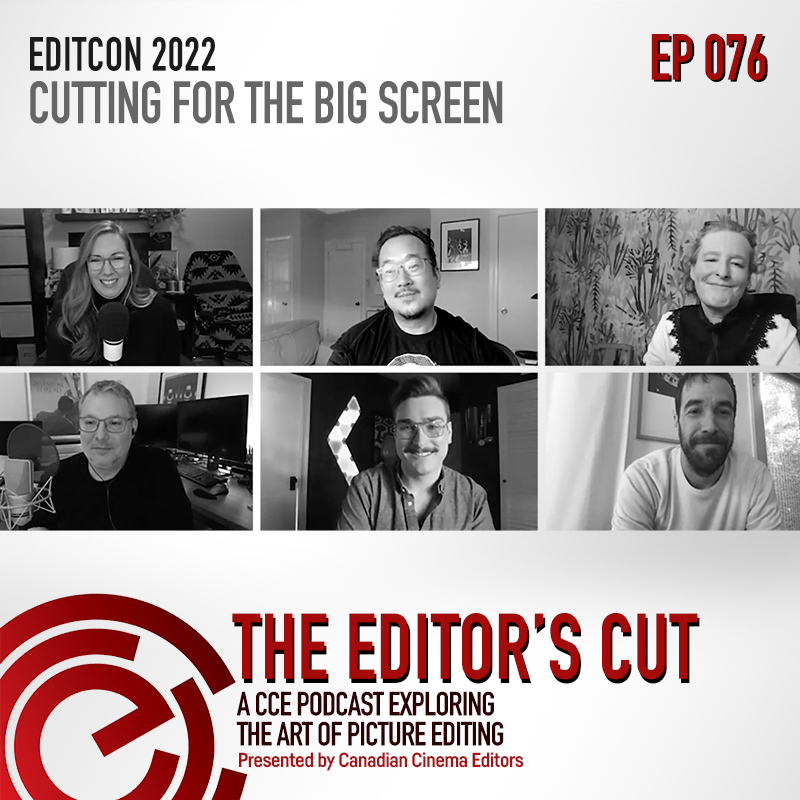
Episode 076 - EditCon 2022: Cutting for the Big Screen
Today’s episode is part 4 of our 4-part series covering EditCon 2022 Brave New World.
Like it or not, the landscape of cinema is changing quickly. With more films at our fingertips than ever before, it’s becoming harder and harder to draw audiences to the theatres. But people still flock to the tentpole films that we all know and love.
Join us behind the scenes as we chat with the editors of: SHANG-CHI AND THE LEGEND OF THE TEN RINGS, ETERNALS and GHOSTBUSTERS: AFTERLIFE as they take a deep dive into their workflows, share their tips on managing large teams and visual effects, and get into the nitty gritty of cutting for the big screen.
This episode is sponsored by IATSE 891.

Listen Here
The Editor’s Cut – Episode 076 – “EditCon 2022: Cutting for the Big Screen”
Sarah Taylor:
This episode was generously sponsored by IATSE Local 891.
Nathan Orloff:
Scripts are like a car manual for a movie. Great if they captivate you. That’s wonderful. That means they’re very successful. But you’re not looking into a human’s eyes. You’re not learning something about them silently.
Elísabet Ronaldsdóttir, ACE:
And for me, it’s a different language. A script is one language, but you have to take all of this and translate it into a movie. It’s where a monologue can become a look.
Nathan Orloff:
Totally. And that monologue might have informed the actor to do the performance that you needed in order to get rid of the monologue.
Sarah Taylor:
Yeah, yeah.
Elísabet Ronaldsdóttir, ACE:
Exactly. So it’s not the script that’s bad, it’s just you have to translate it into a movie.
Sarah Taylor:
Oh, I like that.
Nathan Orloff:
This might be why I’m a little bitter that there’s so little behind the scenes on editing. It’s a hard thing to tell people, “No, the script wasn’t bad. The assembly cut wasn’t… It’s not like these are problems. It’s that this is the process.”
Sarah Taylor:
Hello and welcome to The Editor’s Cut. I’m your host, Sarah Taylor. We would like to point out that the lands on which we have created this podcast and that many of you may be listening to us from, are part of ancestral territory. It is important for all of us to deeply acknowledge that we are on ancestral territory that has long served as a place where Indigenous peoples have lived, met, and interacted. We honor, respect and recognize these nations that have never relinquished their rights or sovereign authority over the lands and waters on which we stand today. We encourage you to reflect on the history of the land, the rich culture, the many contributions and the concerns that impact Indigenous individuals and communities. Land acknowledgements are the start to a deeper action.
Today’s episode is part four of our four-part series covering EditCon 2022: Brave New World. Today’s panel is cutting for the big screen. Like it or not, the landscape of cinema is changing quickly. With more films at our fingertips than ever before, it’s becoming harder and harder to draw audiences to the theaters, but people still flock to the tent-pole films that we all know and love. Join us behind the scenes as we chat with the editors of Shang-Chi and the Legend of the Ten Rings, Eternals, and Ghostbusters: Afterlife as they take a deep dive into their workflows, share their tips on managing large teams and visual effects, and get into the nitty-gritty of cutting for the big screen.
Speaker 4:
And action! Action. This is the Editor’s Cut. A CCE podcast. Exploring, exploring, exploring the art of picture editing.
Sarah Taylor:
Today we’re talking to the editors from Shang-Chi and the Legend of the Ten Rings, Eternals, and Ghostbusters: Afterlife. I want to give a big welcome to all of the editors here today. We’ll start with the Shang-Chi and the Legend of the Ten Rings: Elísabet Ronaldsdóttir, ACE; Harry Yoon, ACE; and Nat Sanders, ACE. Welcome. Also a big shout-out and welcome to Dylan Tichenor, ACE, from Eternals. And Nathan Orloff from Ghostbusters: Afterlife. Welcome to Editcon.
Nat Sanders, ACE:
Hello. Thank you.
Sarah Taylor:
My first question is, how did you become involved with the film and at what stage did you join? Dylan, take it away.
Dylan Tichenor, ACE:
All right. I came on well before shooting. I was called by Marvel and said, “Hey, we want to talk to you about this movie, and would you talk to our director, Chloé Zhao?” I had a great talk with Chloé and she gave me a great pitch for the idea and I was super excited to do it.
Harry Yoon, ACE:
I came on a little bit after. Well, a lot after Elísabet and Nat came on. They started with the movie and Elísabet’s schedule, because they had had to push due to COVID, it came up against another film that she was going to be starting, which was very fortunate for me because it gave me the opportunity to come on as she was leaving. I was so happy that there was a little bit of overlap so I could get a chance to work with both ER and Nat.
But it was just after their director’s cut and they had done a pretty significant restructuring, and so it was actually good for the show, I think, to also have some fresh eyes to say, “After this restructuring what’s making sense, what’s not making sense, how can we enhance it?” And so I was able to help take them to the finish line, but also to provide those fresh eyes, which was really, really fun.
Elísabet Ronaldsdóttir, ACE:
I came on, I got a call from Victoria who asked me to come and meet with Destin Daniel, the director, and we clicked. I also met with Nat and I just knew it would be a great team to work with. So yeah, that’s how I came on, and Nat, take it away.
Nat Sanders, ACE:
This was my fourth time working with Destin, the director. When we were finishing the edit on our previous film, this came up. He was working with me until 7:00, 8:00 PM on our edit, and then he was staying until midnight, 1:00 AM, 2:00 AM working on his pitch for Shang-Chi. He did his pitch for it and didn’t hear anything for a couple of weeks. He thought it hadn’t worked out and we kept editing. And then he got the call and it happened. I was very thankful that he asked me to come be a part of it. He was telling me all these crazy things that they were working up for the script. That was probably in April 2019. And then I probably didn’t actually read the script until about a week before shooting started.
Sarah Taylor:
But you were there at the beginning when the thoughts were just bubbling. That’s great.
Nat Sanders, ACE:
Yeah.
Sarah Taylor:
Yeah. That’s awesome. And Nathan?
Nathan Orloff:
Ghostbusters was my third film with Jason. On Front Runner, I had no idea that he was actually secretly working on this script. I did a independent film and then I got a call from Jason saying, “Hey, can you come to the Sony lot?” I was like, “Sure.” I went. They said which building it was, but I didn’t realize it was the Ghostbusters building on the Sony lot. I was like, “That’s weird.” And then he sat me down and he’s like, “Hey, I want you to read something.” I sat down and read something and within the second page I’m like, “Oh boy, this is insane. What are you talking about?” And that was his official ask. It was very exciting. I came on six months before production started, ended up doing a lot of storyboard work. It was really cool to be in that early to figure out these sequences with Jason and the storyboard artist.
Sarah Taylor:
I love that it almost was a little mini-proposal, take you to this special location and show you. That’s great.
Nathan Orloff:
It was because my mentor, Stefan Grube, who is a phenomenal editor I adore, he was the one who introduced me to Jason and worked with me on Tully and Front Runner. He was on the speakerphone when I walked in and sat down. Because it was a giant practical joke for the two of them.
Sarah Taylor:
That’s great. I love it. I think we should be hired like that everywhere we go. Since all of these films were part of beloved franchises, how did you prepare working on the film? For the Marvel films, did you rewatch the films? What was your process of preparing?
Dylan Tichenor, ACE:
Yeah, I was a Marvel fan, so I had seen all the movies. I did rewatch them all, to be fair. And I watched them in MCU chronology order, which I thought would be a good thing to do, especially for the film I was doing, Eternals, we have some stuff from the earliest bits of the MCU history. Technically, our movie nestles in around after the middle Spider-Man Far From Home. I think we come after that technically, but then stuff that happens before Captain America. I watched that. I did read the Jack Kirby Eternals comics, read a bunch of those. It’s funny to see the difference between the tones. The Kirby comics, they’re ’70s, but with a lot of fifties holdover vibe in it. It’s like Eternal cocktail hour in those comics sometimes. I was a big fan of Marvel from before and more and more as they went.
Sarah Taylor:
That’s a big chunk of time that you got to spend.
Dylan Tichenor, ACE:
It is. It was a good two weeks. It was good.
Sarah Taylor:
Wow.
Harry Yoon, ACE:
Yeah. Thank God we had Disney Plus at the time, because it just made the homework so much easier. It’s so funny, Dylan. I did exactly the same thing because I had seen them all, but then rewatching them in chronological order was really fun actually.
Dylan Tichenor, ACE:
It is fun.
Harry Yoon, ACE:
Yeah. Because it was hard to know with all the little crossover appearances, not having read the script or anything, what was going to happen. Trying to be prepared to see where the character tracks were. When Shang-Chi is placed in the timeline, that felt important. Also just trying to get a sense of what are the rhythms? How are they solving certain kinds of problems, particularly ones dealing with exposition, for example? That was really fun to revisit.
Also reading the original comic books for Shang-Chi was not ultimately that helpful. It was so funny because I remember reading them before my interview with Destin and thinking, how is this going to work? Because it just felt so updated in some ways because of the Fumanchu character and things like that from the original. I think it was my being politely incredulous in a way that opened the door to say, no, no, no, no. There’s this whole reimagining that Destin has done and one that is ultimately trying to update the story so it actually lives well within a time in which there is more of a sensitivity and also a respect for Asian, Asian American culture that’s happening. It was wonderful from the interview on just get a sense of what Destin’s vision was and how excited Marvel was to embrace that vision.
Sarah Taylor:
Yeah. That’s wonderful. Now, since you came on after director’s cut, did you watch previous edits that they had worked on? Or did you just watch the director’s cut?
Harry Yoon, ACE:
Ultimately, yes. From, I think, the first editor’s cut that ER and Nat had done, as well as the latest director’s cut that they were leaving Australia with and coming to LA with. That gave me insight into what is some of the material that they started with and how they restructured it. And gave me an insight into the incredible work that the two of them had done with Destin already. I had the most nerve-wracking session of writing notes and suggestions ever, because here’s filmmakers that I respected so much, and also knowing that ultimately the Marvel trio was going to read these things. I was just like, okay, how do I write it in a way where I don’t get fired on the first day, either from a respect standpoint or from a stupid idea standpoint? But thankfully, it landed okay and I didn’t get fired. That was my first task, which was very nerve wracking.
Sarah Taylor:
Oh my goodness. I can’t imagine. Elísabet, how did you prepare?
Elísabet Ronaldsdóttir, ACE:
I have four children with 20 years apart so I’ve seen every single Marvel movie. But no, I think it was very obvious from the beginning. I mean, it is an origin story. It’s the right from Marvel. They want you to experiment and do different things. They don’t want you to copy the next movie, which I think is great. They’re not copying movies. They want to evolve and try different things and they’re very good to do it.
But no, my prep was mainly meeting Nat. We sat down and talked. What people sometimes don’t understand, editing is 80% talking, just talking about the ideas. How can we do this? And then you take a day and get it all together. But it’s a lot of talking. That’s what I feel I enacted really. I think we worked really well in Australia, which was a weird period for us because we weren’t supposed to be so long. We spent a year in Australia, that was never the plan. It allowed us to dive into the movie in a different way than if COVID wouldn’t have happened. It gave us space, which we actually used very well. I think it’s benefited the movie.
Sarah Taylor:
Yeah. For sure. Yeah, that’s the silver lining of all of this is that we got time away from some stuff. More time’s always better. Well, maybe not always, but it’s often better.
Elísabet Ronaldsdóttir, ACE:
Sometimes.
Sarah Taylor:
Yeah.
Elísabet Ronaldsdóttir, ACE:
But we didn’t get away. We were lucky. We were very well taken care of and we felt very safe in Sydney. We worked every day.
Nat Sanders, ACE:
To what Harry and ER said, the comics really didn’t apply too much here. They were very outdated and full of stereotypes that the movie did not want to deal in. It is an origin story and a bit of a standalone film for them so a lot of the previous material didn’t really apply, which was great and gave us a lot of freedom. For me, I did have to dive into the Marvel world in a way that I hadn’t previously. I went in for a pretty early talk with Jonathan, our producer, Chris Russell Marvel. I don’t think Victoria was in that one. I remember getting asked about the Marvel movies. I had seen Black Panther, so I could talk about that one. I think we’ve done that pretty heavily. And then afterwards, okay, I’ve got to go watch all these.
Sarah Taylor:
You had to do your homework. Oh, this is a little pressure. Nathan, how about you?
Nathan Orloff:
Yeah, no, I watched all the three other Ghostbusters movies and took notes on structure and timing, but mainly watched the first one, I think, twice. Jason intentionally wanted this to be a love letter to the first movie and to figure out what was the magic of that and what worked and why? It was interesting because, just like ER said, that COVID was this weird… In a silver lining, like you said, having more time was a huge, huge, huge benefit in terms of us sitting back, looking at the movie, thinking about it and really experimenting, trying some things. And sitting back with fresh eyes because we had a full month off when we went into lockdown. Didn’t have any media at home, had nothing, and then go back in. It felt like you were watching a movie, like you’re saying to reference, it’s all of a sudden you have this little bit of separation. Now you can look at it in a completely different way.
Sarah Taylor:
It’s almost like when you’re in a cut and you take it and watch it on your TV or whatever, but you couldn’t even go in and do anything because you had no media. It’s just a whole other level. Right?
Nathan Orloff:
Yep.
Sarah Taylor:
Yeah. That’s awesome.
Dylan Tichenor, ACE:
It forced objectivity.
Sarah Taylor:
Yes. Yeah.
Nathan Orloff:
Yeah.
Sarah Taylor:
What was it like being on location while cutting?
Dylan Tichenor, ACE:
Yeah. Went to London for the shoot. I love London. I was happy to be there. We were shooting and based in Pinewood. Great for me. I had just a great team, cut this with Craig Wood. We had a fabulous team. We were ensconced in the Carrie Fisher building, which is a nice building. You get old parts of Pinewood, new parts of Pinewood. And then for me, a great 40 minute commute every day that I rode a bike and a motorcycle. I don’t know. I had a great time.
Sarah Taylor:
Going to another country and being on set, is it a way where you can just… Everything else disappears and you can just be in that world of working on that film?
Dylan Tichenor, ACE:
That is what happens. It’s like a traveling troupe of players, of actors, of performers. And then some of us behind the scenes. In this case it’s 500 people. It’s a great time. It’s like being with the circus.
Sarah Taylor:
That’s awesome. Well, Harry, I know that you were in LA so you missed the Australia trip.
Harry Yoon, ACE:
I did.
Sarah Taylor:
You didn’t get trapped.
Harry Yoon, ACE:
Yeah. Yeah. ER and Nat have some good stories to tell about Australia. Yeah.
Sarah Taylor:
Well, let’s dive in. Tell us about being on location.
Elísabet Ronaldsdóttir, ACE:
Can I tell them, Nat?
Nat Sanders, ACE:
Sure.
Dylan Tichenor, ACE:
Oh my God, yes.
Sarah Taylor:
Tell us. Tell us.
Elísabet Ronaldsdóttir, ACE:
You had a child.
Dylan Tichenor, ACE:
Oh yeah.
Elísabet Ronaldsdóttir, ACE:
It was not in the charts when we arrived in Australia, but he took one with him, and his wife.
Nat Sanders, ACE:
Yeah, my wife and I, we think, oh, this would be such a great four month life experience to go to Sydney. And we got there, not trying to get pregnant yet, and then we ended up coming home with a two month old baby.
Sarah Taylor:
Oh my goodness. That’s amazing.
Elísabet Ronaldsdóttir, ACE:
And what did you name her?
Nat Sanders, ACE:
Georgie. Yeah.
Elísabet Ronaldsdóttir, ACE:
Georgie.
Nat Sanders, ACE:
Yeah.
Sarah Taylor:
That’s amazing.
Nat Sanders, ACE:
Thank you. Yeah.
Elísabet Ronaldsdóttir, ACE:
Georgie has a special place in our hearts.
Sarah Taylor:
Yeah.
Nat Sanders, ACE:
We did have a very unique bond from all of us going through all this together. We had shot about a third of the film before COVID happened so we had enough to where… We did a little bit of lobbying ourselves because we wanted to say all of production was being sent back to where LA or wherever their homes were. But we felt like we had enough to keep working. It would be a waste to not use this time to be able to really refine what we had and see if that would lead to other things. Our third act was probably the least developed aspect of the script so they were using that time to also really go forward with the previs for that. ER and I also were very involved in trying to cut that down as much as we could and helping work with them.
It just kept extending. But it was in small chunks where it was a little stressful where we got extended by I think maybe six weeks at first, but there was still more to do. And just another month and another month. We kept getting some messages where there’s only one plane leaving and it’s in three days and there’s four seats left on it and you’ve got to be packed and ready to potentially get on that plane. That happened a couple times and that was stressful.
Sarah Taylor:
And the added stress of having a baby on the way, I can’t even imagine. Oh my goodness.
Nat Sanders, ACE:
That got more complicated as we went along because yeah.
Sarah Taylor:
Can’t travel. Yeah.
Nat Sanders, ACE:
Yeah.We didn’t know until about the 33rd week of pregnancy of whether we were going to give birth in the US or Australia.
Sarah Taylor:
Well, what a great story for little Georgie. That’s awesome.
Nat Sanders, ACE:
Yeah.
Sarah Taylor:
I love it. Nathan, you were up in Alberta. Tell us about your experience.
Nathan Orloff:
Yeah. I wasn’t there the whole time. The way that we initially split everything up, Dana, my co editor and I, and this is based on my previous experience on other films, was that I was tackling more of the effects, horror and any action sequences. And Dana was doing some more of the comedy and drama stuff that she had also traditionally worked with on Jason’s previous films, like Chino and Up in the Air. When it came to shooting all the stage stuff… Because the way they scheduled it is when the winter came and started snowing they went inside to the stages in Calgary. That’s when I flew up and I basically set up shop because they built two farmhouses, one on location and one on sound stage and they were identical. I set up shop in one of the rooms upstairs in the farmhouse. I just would go up to it. I’ll be like, grab my coffee, say hello to people, walk upstairs and it was a really great experience. I loved being in Calgary.
Sarah Taylor:
Do you have any good stories of being on set?
Nathan Orloff:
One time they did turn off all the lights. Well, I got distracted and didn’t know that everyone was going home and all of a sudden I’m in this house and it’s pitch black. I’m like, well, I got to figure out how to get out of here. As an editor, I’m always incredibly grateful and a little bit probably awestruck in terms of the camaraderie of production when they’re all a little grumpy and whatever and I’m like, “This is great. We can be a team.” And they’re like, “Okay. Whatever, guy. Go on your computer.” I really, really enjoy it. It’s one of my favorite things. Assembling on location and being on the mix stage are my two favorite times in post.
Sarah Taylor:
Yeah, yeah. There is something special about being on set. I’ve only gotten to do it once in my career . yeah, I was like that. I was like, oh my gosh, there’s sandwiches. Go to the craft services. It was the best thing ever.
Nathan Orloff:
And there’s a little bit of less pressure to me because I just got back from location a month ago on my new film. To me when you’re assembling you’re like, this is my first step. Let’s just make sure we have everything. Make sure I’m not throwing up any red flags. There’s not the pressure of is it perfect yet? It’s just my initial take and I have to include every single line. It’s not as to me as high pressure as everyone on set that they’re having to do their absolute best because this is their one shot to do it. It’s the complete opposite on our end.
Sarah Taylor:
So who was in your editorial team, like assistants and of course editors? How did you divide up the work?
Dylan Tichenor, ACE:
Yeah, I cut this with Craig Wood. He has done a few Marvel movies. We divided it pretty half and halfie where we got the same amount of action and dialogue. We wanted to do it that way. We both feel comfortable with it. We sorted it out ahead of time. I’m interested in this. Oh, I’m interested in that. And then divided it up as we’re shooting in such a way that we stuck to our original plan, but made sure that no one was without footage and no one had too much footage. That worked quite well. And then he and I would just bounce ideas back and forth about the other person’s sequence or whatever. But that’s how we did that. We each had our first, so two firsts, three seconds and two VFX editors and two PAs, that was basically our production crew. And then in post a crew a little bit more.
Elísabet Ronaldsdóttir, ACE:
I brought my very loyal, amazing first, Matt. I’m trying to remember his last name.
Dylan Tichenor, ACE:
Apsure.
Elísabet Ronaldsdóttir, ACE:
Apsure. Thank you. Sorry, Matt. I’d rather not make a movie without him. He’s amazing. And then we had a very big Australian crew, an amazing visual effect editor. The visual effects were a huge apartment and we had to work very closely with the visual effects. Because I’ve done big visual effects movies before, but one of the things with Marvel is you better keep it right on your timeline because you can turn around and suddenly they’ve just made the shot. You’re like, oh.
Sarah Taylor:
Whoopsy.
Elísabet Ronaldsdóttir, ACE:
You have to be very much on it, that timing, and not something you’re going to think about later. Just do it.
Sarah Taylor:
Yeah.
Elísabet Ronaldsdóttir, ACE:
Do it right on your timeline. That was the biggest lesson, because they were fast. We were talking animated creatures and all kinds of stuff.
Sarah Taylor:
Wow. Yeah.
Elísabet Ronaldsdóttir, ACE:
Even though it was a previous or a stunt fish that came in, but you just had to make it right.
Nat Sanders, ACE:
Yeah. I would say for me, the biggest lesson was in delegating sound work to our assistance team. For me, I haven’t worked on something of this scale where the sound work was just on this massive of a scope. I love working with sound and had always done it myself in the past in temping, but it became clear very early that that was just not going to be a remote possibility on this. We found ER’s assistant, Matt, did a ton. Luca, my assistant in Australia, did a ton. They did an amazing job. I have to say that their work carried through the entire process. The mix was fast on this. I would say a lot of what Matt and Luca did really was the template for what ended up in the final film sound wise.
Harry Yoon, ACE:
When the team left Australia, we left behind a couple of their amazing Australian assistants. And then we added two firsts. My first, Irene Chun, and then Leslie Webb took over as Nat’s assistant. And then we added two seconds, another VFX editor. At a certain point when our crew was largest, it was probably 11 people. And then that on top of that, there’s this whole army of VFX coordinators. It’s so funny because they are such the continuity between Marvel projects. They have all the best swag, they have great jackets and shirts and stuff like that. They’re on all the Zoom meetings. One of the things that we had to get used to, or I had to get used to, because I hadn’t worked on visual effects movies as an editor, at this scale was how long those reviews were.But it was so funny watching the VFX coordinators that they were so unruffled no matter how crazy the changes we were suggesting were that it was almost like, okay, well if they’re not freaking out then we don’t have to freak out necessarily because they’ve been here five or six times before.
But yeah, the crews are huge. What’s nice is that Marvel takes care of… Especially on their larger teams, they take such good care of their people that you have that continuity. You can sometimes get the inside track to say, how does this compare? Or how does this moment in our post process compare to what you guys have gone through before? If you’re new to that family, then I think you can get some good level setting and some good advice as far as how much should we worry about this at this point and things like that. That was fun.
Elísabet Ronaldsdóttir, ACE:
And we worked really closely with the visual effects, which was a grateful thing. All the design of the visual effects, Chris Townsend, was the mastermind behind visual effects. There was a really close-knitted cooperation, getting the visual effects right and the edit and the story and the characters. A lot of meetings. This is one of the things that has changed during the pandemic, because you used to have maybe one a week where you would meet with visual effects and stuff. Now it’s every day because everyone can just hop on whatever software you’re using. Was it Evercast we used?
Nat Sanders, ACE:
Clearview, I think, right?
Elísabet Ronaldsdóttir, ACE:
Clearview, yeah. Yeah. It’s becoming a lot of meetings.
Nat Sanders, ACE:
But rather than doing those VFX reviews in the theater next to our edit suites the way I guess it normally would’ve been done, we were doing them all over Clearview. To Harry’s point, towards the end of the process when it was Harry and I, we were already staying until 11:00 PM every night, at least as it was. During those VFX reviews, which were happening every day towards the end at least three hours, you just had to work on your own things. If they were in Harry’s scenes that he was working on, I had to be just putting the VFX review off to the side and just loosely keeping an eye on it, but working on your own things. So I can’t even imagine if we’d gone to the theater every day and you didn’t have that luxury of being able to work on the side. You’d be there until 1:00 AM every single… yeah.
Sarah Taylor:
So another silver lining. Nathan, I know that you worked with Dana Gloverman, ACE.
Nathan Orloff:
Yes.
Sarah Taylor:
Tell us how it worked.
Nathan Orloff:
It’s similar to what Dylan mentioned. Once we got to shooting, neither of us were ever without something to cut, so there’s plenty of drama scenes that I worked on. We would talk about everything. We became very, very close very, very fast. I think of her as a sister now. We would show each other everything, talk about everything. There’s not one cut in this movie that we haven’t talked about together. I learned so much from her, especially on some of these things that you pick up over because she says a lot more experience than I am, especially on specific rhythms, on comedy beats and dramatic beats and dialogue. It’s two, three frames, and one frame here. Just all that stuff. Really just kept my eyes open and the ears open. I learned a lot from her. It was a really good process. I have to say, compared to what Harry described about Marvel in terms of they’re not phased about changes. I’m like, that sounds great. Can I get a number for some of those? It’s not always like that.
There was one time very late in the process on the monster which is the thing that is closest to the boards of any of our sequences, but it was very late in the process and I was just wracking my brain. What’s bothering me about the ending? Because we had that time away on COVID and we had the time to come back. I was like, well, we need a wide shot. We need a wide shot right at the end, really establish the stakes, establish the geography. Right before the climax we need to see the ghosts and the trap and the car and then Phoebe with the gun. We need to see it all in one thing. I was like, that’s expensive. I first talked to Dana. I was like, “What do you think?” And she’s like, “Oh, you’re right.” And then we talked to Jason. Jason’s like, “All right. Let me talk to the VFX team.” It a whole big thing and it’s in the movie. It worked out well.
Sarah Taylor:
That’s awesome. You’re like, oh, that’s expensive. I love it. Well, we talked a lot about visual effects already, and I want to ask, specifically, what did your dailies look like? Were you getting just the green screen stuff or were you getting some previs already put in that your assistants put in for you? What were you actually working with when you first started assembling the film?
Dylan Tichenor, ACE:
Yeah, we had previs to start. I came early to cut previs and help with that, trying to concentrate on the bigger sequences where we needed to narrow it down and get the scope of it sorted out. I had been through the previs. When we start getting dailies, I think Chloe Chow, the director writer on this one, probably shot a little more locationing naturalistically than a typical Marvel movie. That said, every shot has effects in it so it’s just about how much green really is on the set because stuff’s going in the shot whether there’s green or not. I think we probably had less green screen from dailies because she just didn’t want to have that. It all gets wrote out anyway essentially. It’s becoming less and less of a thing.
We had viz early on and then stunt-viz when they started working on the sequences. Some of the more choreographed fights were stunted out. I would just slot stuff in as I would get it. So start with viz and then put the stunt-viz in. And then when we had a test shoot or the beginnings of second unit or whatever, start slotting plates in and you just build on the latest material you have. We have a lot of characters in this movie, so there were frankly a lot of people talking and doing stuff in the frame. We also had a lot of creatures, so there are lots of empty frames, or guys in gray suits. You just work with whatever you have and beat it out and start building.
Elísabet Ronaldsdóttir, ACE:
We did have a lot of previs. We also had how many visual? 1,750 I think visual effect shots.
Nat Sanders, ACE:
Yeah, I can’t remember now, but it’s way up in there, like 1,000.
Elísabet Ronaldsdóttir, ACE:
We had a lot of previs. We do have also imagination, so I think it worked out. But yeah, it can be weird, especially if you have to show it to someone else. I’ve been on movies where you had to test them before there are any visual effects done, but they didn’t want to have blue screens or green screens in anything we screened so it all had to be filled out.
Nat Sanders, ACE:
I think it was even the director’s, wasn’t it? The director’s cut for [inaudible 00:33:21]-
Elísabet Ronaldsdóttir, ACE:
Yeah, we had to fill it all out.
Nat Sanders, ACE:
No blue, so we had to do a whole pass. Either we would get the first early visual effects on shots, or our team would have to even gray things out just to remove all the blue. The first half of our film is very grounded in the real world and it’s not so much with blue screens and things. And then the back half, especially towards the end, it got more and more and that was the end of the shoot. We kind had built up to that. It just required a lot of communication with the VFX team of what’s happening here? We would work together on figuring out how to nail down the timing of it.
Harry Yoon, ACE:
One of the interesting things that I noticed was that you’re almost never out of dailies on this type of film, just because I think there’s so much experimentation that goes on through the post process. I think that’s one of the hallmarks that I noticed in the Marvel process, especially the trio that I mentioned, who’s Kevin Fiege, Louis D’Esposito and Victoria Alonso, they are never afraid to try things. They’re never afraid to improve or enhance a particular character arc or the understanding of a key point of exposition. We were constantly returning to previs for certain sequences to simplify things, to clarify things. You’re recutting previs again into normal dailies.
One of the benefits of shooting a lot of the action against blue, for example, is that you might be able to steal a move to shorten things, to connect things. You’re experimenting going back to those things and maybe reusing them for a different purpose. There’s always this constant inflow of trying new stuff and going back to raw material. It was fascinating to keep up with that churn, the slowly receding waves of previs and blue screen and things like that. That made it really fun.
Sarah Taylor:
I watched the Disney Plus behind the scenes of Shang-Chi. Even watching some of that, I was like, I didn’t realize how much green screen and blue screen was there. It made this question more interesting because there’s so much more that you’re like, oh yeah, I guess that’s what they do. I guess that’s how it works.
Harry Yoon, ACE:
It’s a real testament to the quality of the visual effects. As ER said, Chris and his team, what they were able to put together to make it feel so grounded and so real. Yeah.
Elísabet Ronaldsdóttir, ACE:
Also I agree. Also, as Nat pointed out, the whole first part is really grounded. Backgrounds don’t really change the story necessarily. The first part was easier that way. And then you go into dragons and weird creatures and magical animals and you have nothing.
Sarah Taylor:
Yeah.
Nat Sanders, ACE:
Our early action scenes, to her point, say the scaffolding scene that ER cut, all the action is there and it ends so it’s really just the backgrounds that are getting filled in. Yeah, like she said, that’s not really affecting your pacing or anything else.
Elísabet Ronaldsdóttir, ACE:
But then again, you still have to know certain things because it can absolutely affect the edit. Dialogue, more and more dialogue. Talk to the visual effect team. Talk to your director. Talk to everyone.
Sarah Taylor:
Like you said earlier, it’s all about talking.
Nathan Orloff:
Our dailies, it was pretty complicated sometimes in terms of here’s just an empty plate and there’s nothing there. Initially, I just took the ghost from the storyboard and I just took it in Photoshop and cut out the ghost. I was cutting with a Mario ghost where it was those… You do key framing in avid, here is a fly on this and you have to take it.
Sarah Taylor:
Spooky
Nathan Orloff:
… very seriously. And it was very funny. This actually transitions a little bit to a question I missed previously, is that very early on our brilliant VFX editor was able to use 3D models provided by VFX to at least get… He had a turntable so he could get the right angles. It was all of a sudden now in color, which was new. We had one VFX editor, eventually we had a VFX assistant. Dana and I shared a first, we had a second and then an apprentice. Everyone was just completely top-notch and wanted to make everything the best they could and stayed with us the entire process, and through COVID, too. We were a family. We really were.
Sarah Taylor:
You all touched on this a bit about having a blank plate and how long do I leave it on for? How do you determine pacing when you have these big visual elements that are missing? You have all these fight scenes and these beautiful scenery. How do you make sure that you develop your character still?
Dylan Tichenor, ACE:
Some sequences start from nothing. It’s never been boarded. Maybe it’s a new idea. This happens certainly at Marvel quite a bit where you go, well, what if there’s a beat where this happens? Or what if we add to the head of this scene and these things happen? You do cards, medium shot, she comes out of the door, and then close up monster jumps, things like that so that you beat it out to show people this is the basic idea. Then previs can go in and do shots for you. And then that’s the next level of that.
I think it depends on what you’re starting with. If you have stunt people, stunt players in gray suits, you have those movements and choreography to work with. If you don’t, you’re often doing the acting yourself. As Elísabet noted earlier, when you have 3D from scratch creatures that it’s not a human mocap or a performance capture or anything like that, it’s from scratch a creature, you’re acting it out in your head when you’re designing the shot, you’re going, okay, rawr. And let’s cut. You do all of that.And then you build the sound effects in to support your idea of the pacing. And certainly the music can help you. But usually you’re tailoring the music to what you want the sequence to do, but that also helps the flow through. It’s sculpting. You use huge chunky lumps of clay in the beginning, like rah, rah, rah. And then it gets more and more refined. You’re just constantly upgrading the quality and detail and granularity of the performance and the idea. I think that. And then what was the second part of the question?
Sarah Taylor:
Well, developing your character still when you have all these giant elements that are breathtaking that we all want to see but-
Dylan Tichenor, ACE:
Honestly, it’s a big balance in all these movies. A big challenge in Eternals was how much information do we need to keep people in the boat wanting this story, but no more and no less? And the fine tuning of that, turning that dial was a big part of the process because Chloe is an intellectual filmmaker and the script had a lot of talking in it, to be fair, the balance of that. Craig and I were always going back and forth to each other, “Do we need this line? What about that? Do you still have this beat in your scene because maybe I don’t need that same thing in my scene.” Because it was just a real focus of the storytelling.
I think that’s always a thing in movies, whether you have 2000 VFX shots or four. The balance of how much information you need to give the audience so they are emotionally tracking with you is one of the biggest jobs that we do. I think it just becomes a little bit more pointed with a VFX thing because you know there’s 25 minutes of act three that’s given over to boom, boom, bang, bang. When you do it right there’s story in the action and there’s momentum in the dialogue. You need that cross and scenes have to do multiple things. That is often down to the writing. When we would rewrite and rework things, you go, can’t we do both these things in this sequence rather than do one and then the other and the next sequence? It’s just this ongoing focus on efficient and captivating storytelling.
Sarah Taylor:
Yeah. Well, that was really good.
Elísabet Ronaldsdóttir, ACE:
I think that was very well said.
Sarah Taylor:
Yes.
Elísabet Ronaldsdóttir, ACE:
Let’s face it, you just described editing. It doesn’t matter what you are doing, if it’s a Marvel movie or something else, it’s all about story and characters. With a big movie, with a big budget, you might have a lot of visual effects, but your focus should still be story and characters.
Dylan Tichenor, ACE:
And it’s like music where you can put music on too early or too much of it, and that solves problems, like wallpaper. Papers over, bad transitions or unmotivated actions and stuff. You just go, no, no, the music will take care of that. Effects can do that, too, where you just distract people and go, well, this is fine. But whether they know it intellectually in their forebrain or not, they feel it in their stomach. Wait, I don’t understand the actions of this character, therefore I’m not behind them. And then you’ve lost.
Sarah Taylor:
So important.
Elísabet Ronaldsdóttir, ACE:
Right.
Harry Yoon, ACE:
Yeah, I think that tension that Dylan talked about where you need to know enough to not be distracted by the logic of what you don’t know and you need to know enough to invest in these characters. That’s one of the hallmarks that I found of the process that we went through was that there’s so much testing that Marvel does with its audiences that they test the film much more often than other larger features that I’ve worked on. So much of what they’re listening for with their audiences is, when are you invested in these characters? What is it that’s distracting you? Because you don’t know either a piece of exposition or how the world works? Because there’s so much world creation going on. You’re often entering a world for the first time and saying, okay, what does this tribe do? What powers do they have? How does that impact the story? And how much of that do you need to know to not throw up your hands and just tune out for a while because you don’t understand what’s happening?
If you set us an action sequence in New York, you know the gravitational properties. The hotdog vendor doesn’t necessarily can’t shoot laser beams out of his eyes or something. You don’t have to explain those things in order for somebody to be invested in the stakes. Whereas I think in this film you’re constantly living in the tension of just enough. How much do they need to know in order to invest in what’s going on? And how do we keep economizing on that and experimenting with that so that they’re engaged but not overly explained so that they’re bored?
Nat Sanders, ACE:
And to what Dylan and Harry have pointed out, in our case, we had this long prologue at the beginning of the film that on page was great and it really worked and it was basically the parents’ backstory. Everything that happened with the parents and young Shang-Chi all was in this first 20 pages of the script. And then we land on adult Shang-Chi in San Francisco and then we’re off from there and everything was linear. ER from the very beginning during all those talks she talked about would come in my office in the middle of the day and be like, “We got to do something about this effing prologue. It’s not going to work.”
Harry Yoon, ACE:
[inaudible 00:45:24]. This effing prologue.
Nat Sanders, ACE:
We were talking about it. We obviously tried to make it work linearly the way it was up. If it had been 10 or 12 minutes and maybe 15 minutes at the absolute most, then maybe there was a way to make it work. It was never going to get down to that length. You were finding out things that you just didn’t really as an audience member want to find out yet. ER really led the charge on it and it led to discussions between me and her and then eventually with Destin about how do we tell this story in the most satisfying way?
When we first showed our assembly cut to Destin, I think it was still mostly linear. Maybe with the prologue maybe you had messed around some, but it was for the most part still plain linear. And there were great elements all throughout the watch, but there was something not unsatisfying about the watch and something wasn’t right. Pretty much the next day the three of us got together and said, “What about if we restructure and just use this prologue as flashbacks throughout the film and you find out those things when you emotionally want to find out about them?” We would create a lot more mystery than we had had when it was all playing in linear fashion. There was no doubt about it. As soon as the idea got broached, all three of us were on board. We just started-
Elísabet Ronaldsdóttir, ACE:
And we did our first pass on the wall, because what’s so good when you have to do such a huge reconstructions, what’s good is just print out your sim cards. And then we were just moving them around on the wall. What if this is there? Then we’re talking again, talking our way through it. What if this happens here? I feel that’s a really good tool to have, sim cards and a good wall.
Nathan Orloff:
I agree with everything you guys have said. It’s fascinating. It’s hard to convey on a page is that if you trust your characters, if you trust the performance, you don’t need this line. You don’t need that beat even though it was written. If you lean in, if you make the audience lean in, if you make them care, that’s more important than anything else. You can explain stuff later on, you can explain the backstory. Maybe in the weird way it was good that it was written linearly as a prologue so you could chop it up and do whatever you want with it in post. But if it was written that way, you’d be trapped into certain versions.
It’s fascinating to me, because to me scripts are like a car manual for a movie. Great if they captivate you, that’s wonderful. That means they’re very successful, but you’re not looking into a human’s eyes, you’re not learning something about them silently. Ghostbusters went through more reconstructions in the third act figuring out what people need to know when and that was fascinating. But yeah, in terms of when to lean on characters and how to cut around empty plates, music is very, very useful. I ended up memorizing the Ghostbusters soundtrack and the music stems from the original because it’s different than the soundtrack in terms of, all right, what kind of beat here? What kind of rise do I want? I would make a silent beat where reverb a sound out and then do a slow old martino rise. I’m like, all right. That’s how I’m finding my taste with these empty slots. But as Dylan said, all these cuts need to work without music. You can lean on music, you can lean on sound too much, but I find it very useful, especially with empty plates, how to time them out.
My issue initially, especially since this is my first time in the editor’s chair on this level of visual effects film, was I left everything very long initially because a lot of this stuff was title cards and you needed time to read them. This to me would be the benefit to having actual previs of actual 3D models doing a turn, doing a thing, was that you’d be able to time the movements, but in order to understand everything at all my plates were all initially long and everything just got faster. But that’s a normal movie anyway. The mother character, Callie, in our movie, we ended up losing a lot of exposition, a lot of exposition, especially with the relationship with her father because we ended up, if you care, you don’t need to know. More ambiguity. Ambiguity in that regard was better. There was a great saying that both Dana and I learned on this movie and it was, it’s better to have your audience confused for 10 minutes than bored for 10 seconds.
Dylan Tichenor, ACE:
Oh my, yeah.
Elísabet Ronaldsdóttir, ACE:
Can I add to this? Because I love this, Nathan. I absolutely love the whole discussion about script versus film. For me it’s a different language. A script is one language. Well, you have a costume designer translating it into costumes and et cetera, et cetera, but you have to take all of this and translate it into a movie and it’s not the same language. It’s where a monologue can become a look. I find it so fascinating. It’s a different language. The script isn’t bad. Even if you have to reconstruct the whole movie, it’s not because the script is bad, it’s because it’s a different language. It just takes different letters to make it work.
Nathan Orloff:
Totally. And that monologue might have informed the actor to do the performance that you needed so in order to get rid of the monologue,
Elísabet Ronaldsdóttir, ACE:
Exactly. It’s not the script that’s bad, it’s just you have to translate it into a movie.
Sarah Taylor:
Yeah.
Nathan Orloff:
This might be why I’m a little bitter that there’s so little behind the scenes on editing. It’s a hard thing to tell people, “No, the script wasn’t bad. The assembly cut wasn’t… It’s not like these are problems. It’s that this is the process.”
Sarah Taylor:
I wanted to quickly touch on sound because you’ve all talked about it in different moments. Are there any specific sound effects that travel the Marvel universe that you used in your edits? And then same with Ghostbusters, did you get to get sounds that were from the original movies that you threw in? I’m just curious how that comes within the edit suite before it gets sent off to the magic sound world.
Dylan Tichenor, ACE:
If you’re working on an Avengers movie, yeah, there’s going to be sound effects that were established and sounds of things, Thor stuff and all of that. For Eternals, all new characters, all new people, related, but really no crossover characters in there. We did use as temp a lot of stuff. Ego ship, I used backgrounds for that. Thor’s hammer and swords and Valkyrie’s this and that. Yeah, used a bunch from the Marvel toolbox. Craig brought his stuff, I brought my stuff. We just used whatever we had to hand to build the idea out. And then as we went forward, we got a specific toolbox from Skywalker. Addison was our sound supervisor. As we started to talk about sound and we did a bunch of meetings where he would present some stuff, then we would give him notes with Chloe and just talk about the sound design of the movie in general, the creatures, the powers. Mainly how to differentiate those because we had so many of each and trying to keep things helping with the storytelling through sound.
I think we used what we had until we could replace it with our movie specific stuff as Addison got farther and farther along. Craig and I both love sound a lot and we did a lot of work and built it pretty full tracks as we were building the sequences. A lot of that informed the discussion and became the template for what ended up being. But it’s a very iterative process where you go back and forth and go, do we use Thena’s new sword sound for this? Or is this more like the version C? That kind of thing where it’s just so granular.
Sarah Taylor:
Amazing.
Dylan Tichenor, ACE:
Yeah.
Elísabet Ronaldsdóttir, ACE:
We had no sound library because we didn’t know, right? We didn’t know how his rings would sound or all those magical animals. We didn’t have a roadmap. Katie Woods helped us. She did some pre-designing while we were still in Australia.
Harry Yoon, ACE:
That library did start to grow as we continued to work with the team at Skywalker. We had the benefit that they’d worked on a lot of shows before. A huge benefit that there was continuity in terms of our mixers that had continued to work before. Both the sound design team. Since they have those libraries available, they could start winnowing those sounds into our cut. I just have a funny story where early on, spoiler alert, when there were some Dr. Strange sounds entering into our cut, for some reason we didn’t have the sound of the portal opening and staying open for a very long time so we literally had to rip it from a Dr. Strange movie. Anytime we did a trim, we would roll the trim and then you’d start hearing Dr. Strange dialogue underneath our cut. I’d be like, who’s talking during this time?
Sarah Taylor:
I love it.
Harry Yoon, ACE:
So there’s a little bit of challenges in terms of temping from existing Marvel movies. But yeah.
Sarah Taylor:
That’s great.
Nat Sanders, ACE:
Another interesting aspect of it too is when we would do our previews, often when you go do a preview you’ll stop at a certain point before the preview and you go into a temp mix for a couple days with the sound mixers. Marvel is just so much about story and about the edit that I think, maybe I’m guessing, but I don’t think they want to give up that time to continue working the cut. We were always using our Avid mixes during those previews, which just put an extra, not pressure, but I guess responsibility to make sure that you were representing all of your creatures well. Everything had to be on point because we were screening these for audiences and they had to play real.
Dylan Tichenor, ACE:
And that mixes with Marvel.
Nathan Orloff:
That’s great to know because I’m a huge fan of not doing temp mixes and just doing it on the Avid. We did that on Star Trek Into Darkness when Avid first introduced 5.1 audio. And then we were like, what if we just didn’t do a temp mix? It was grand experiment, but I’m glad that’s… We did 10 mixes on Ghostbusters and they were very intense and stressful.
Dylan Tichenor, ACE:
I mean, it’s great for the mixers to be able to go through it.
Elísabet Ronaldsdóttir, ACE:
I want temp mixes.
Sarah Taylor:
You want them?
Nathan Orloff:
I’d rather save the days for later. Take the same amount of money, just put it for final.
Elísabet Ronaldsdóttir, ACE:
Well, I don’t think that’s a money problem with Marvel.
Nathan Orloff:
That’s true. That’s true.
Elísabet Ronaldsdóttir, ACE:
Or anyone. I just feel, especially dialogue, is so important and dialogue is sometimes recorded under very difficult circumstances, whereas pre-sound mix really can save your ass for clarity so people understand what’s being said. That’s why I feel very strongly about getting a temp mix. Also, because I am not a sound person. I do appreciate sound and it’s extremely important to my edit, but I’m not going to do it. I could just as well go and do a heart surgery or something. It’s not my talent.
Sarah Taylor:
I love it.
Elísabet Ronaldsdóttir, ACE:
I edit movies. I don’t do sound. I feel it’s important that people have their expertise. The same way I wouldn’t do graphics. I’m not doing it. Hire a person, a graphic designer.
Sarah Taylor:
For sure.
Nathan Orloff:
That’s how Dana worked as well. I don’t know. Sound and music for me is a place I’ll go to if I’m stuck on an edit and I need to refresh. I like doing sound. And then like I mentioned for the storyboards, we’re very lucky, especially Jason has such a specific vision for this movie to be a lot like the original [inaudible 00:57:34] movies. Having the stems from the original was a huge, huge help. And having what he described as almost steampunk. Yes, someone just created this device, but they made it with duct tape and glue. It barely works. It’s not like a Star Trek shiny thing. It’s supposed to rattle when it turns on. There’s a specific vibe that was very useful to get. Having all the stems, especially for the boards sold you on the world and the tone.
Dylan Tichenor, ACE:
Totally.
Nathan Orloff:
And that stayed on. The most difficult sound, like the story of the Dr. Strange, the trap sounds specifically, when the trap opens, there was no archive of what their original one was. So Will Files, one of the sound supervisors, he had to take the stem and subtract Slimer from the frequency spectrum in order to… It was like sound archeology-
Sarah Taylor:
That’s amazing.
Nathan Orloff:
… in order to get that trap sound.
Dylan Tichenor, ACE:
That’s just the Slimer notch. It’s in the [inaudible 00:58:37].
Nathan Orloff:
Yeah, exactly.
Elísabet Ronaldsdóttir, ACE:
There is a funny Marvel music story from Shang-Chi. Someone pulled a number on me and Nat because we were both first timers. We were doing the third act and we needed to temp it with music. It was more or less all postvis. Someone said, “Oh, they want you to take from the other Marvel movies.” I remember we went through the whole music library and temp them to pieces. And then they hated it. We can’t concentrate on this, getting music from another movie.
Dylan Tichenor, ACE:
Kevin saw it and said, “All I can think of is Spider-Man.
Elísabet Ronaldsdóttir, ACE:
So we had to clear it all out and get something else in, but it was funny.
Sarah Taylor:
Oh my goodness.
Dylan Tichenor, ACE:
Oh, lots of stories.
Elísabet Ronaldsdóttir, ACE:
Someone wanted us to sweat.
Sarah Taylor:
Yeah, I’ll get you to sweat. My next question is, how did you all approach representation in your edit? Because in Shang-Chi we have an almost entirely Asian cast. Ghostbusters, we have a neurodivergent main character. In Eternals were introduced to one of the first South Asian superheroes and a deaf superhero. What were your thoughts and approaches to making sure this was tackled in the best way possible?
Dylan Tichenor, ACE:
It’s certainly something that Marvel has been concentrating on more and more. I really applaud and appreciate their efforts and the earnestness and genuineness with which they have approached inclusivity and representation in their movies because it has typically been a English speaking white guy kind of thing. I think they’ve done fantastic work. Eternals from the get-go, from its conception, was meant to be representative of other less-represented peoples. Chloe cast a, not American, but Asian English person as the lead. We have a gay black character and we have a deaf character, all of that.
I got to say, Craig and I both and Chloe came at this from the point of view of, we’re very proud and are behind all the representation, but that is not the point of the movie. We never wanted to bang that drum or put a spotlight on it. These are just the characters. Marvel went to great lengths to check things with people to show Lauren Ridloff, our deaf performer, the cuts and the ideas. Does this work? Is it okay if we change this one word to make it seem better? Because we don’t want anyone to feel like they’ve been duped or anything like that. Brian Tyre Henry, who plays Phastos, he had an onscreen gay kiss that was a big deal.
Craig cut that sequence, the Phastos house. I said, “I think the kiss in the dailies is fantastic, just as long as we don’t highlight it and push in on it and do music on it as if, look at this, guys.” And he said, “Oh no, we’re not going to do that.” I think we all had the same opinion. This is who the characters are. We support them and we are proud of it, but it’s not what the story’s about. So it gets its place. I think we’re proud of how we did it. In fact, when we would do the early screenings and we would ask, “What do you like about the movie?” And the audience would go. “Love the representation.” We’d all just look at each other and go, great, whatever. Yeah, we love it, too. What about the story? What about the characters? So yeah, I’m proud of how we did that. I’m proud of Marvel in general. I’m pleased to have been part of it. It’ll be great when humanity has passed this bump.
Harry Yoon, ACE:
Yeah, I think that was really well put, Dylan. I’m very proud that Marvel makes this a priority. I think it’s in having all the filmmakers involved care about the details and to know what questions to ask so that those details feel correct. Because it’s all about nuances. I think people who are watching for this kind of thing know when it’s surface versus authentic or feels grounded. Everything from what kind of TV program is Katie’s family watching in the background as they’re eating breakfast? How do you pronounce in their dialect the rice porridge that they’re eating in the morning?
Or just being concerned about, there’s been this whole history of a lack of Asian males as desirable characters, as romantic leads in the history of Hollywood. How do we take that into consideration when thinking, should Shang-Chi have a love interest? What is his relationship with Katie like? How do we maintain what their chemistry is like, but still acknowledge that he is potentially a desirable person? There was all of this talk, to ER’s point, a lot of this discussion and it informed the small choices that we made. But those small changes, those small details, I think are the things that audiences really loved and appreciated. When they saw Shang-Chi taking off his shoes before he went into the apartment, there were these little explosions of meaningful details that allowed people to feel seen, that allowed people to say, “Oh, this feels very real. It doesn’t feel like just a surface nod to something. It feels like somebody that I know.”
Nat Sanders, ACE:
I have to say, with that scene the Harry’s alluding to with Katie’s family, that was one from the very beginning that there was always a discussion, is this scene going to stay or not? Because we’d had a scene with their friends at the bar, and then we have another expositional scene with Katie’s family. We come back at the end of the film to the friends at the bar, but we don’t see Katie’s family again. There was always a discussion, is this going to stay? I have to say, Harry really advocated for it. We did a couple previews with it in and we still were on the fence. I think for the third preview, we were going to try it. I think we were leaning towards trying it without it. I think Harry, to his point, I said, “If we take it out, it’s probably not coming back in because it doesn’t move the plot forward. We’re not going to probably in that way we won’t miss it.”
I think at those first couple previews we’d requested that they try to recruit a certain percentage at least of Asian American audience members and I think it hadn’t quite happened. This third one, we were going to have a little bit more of an Asian American audience so we tried it one more time and it was just exactly what Harry said in the talk back afterwards. We just kept hearing, “I felt seen in that scene in Katie’s family,” and pointing out all the details. It was just so obvious how Harry had been to advocate for it. Yeah.
Elísabet Ronaldsdóttir, ACE:
I think it’s to a big credit, both to Marvel but also Destin, who was extremely keen on bringing forth a contemporary feel of the Asian community and not just the magical one.
Nat Sanders, ACE:
On a more smaller scale, too. Both ER and myself and then Harry when we were back in LA, we always made it a priority that bare minimum have one Mandarin speaker on our edit team. We would always have, I guess, it ended up being a second in each case. It was Lisa in Australia and Ujang back in LA. Especially towards the end with Ujang, she was incredibly informative about the details of phrasing, especially we were rewriting a lot of voiceover that was in Mandarin and she was a really integral part of a lot of creative decisions.
Harry Yoon, ACE:
Just real quickly. There was a joke towards the end that played so well with English speaking audiences. The thing that Tony Lang’s character was saying was so funny when it was in subtitle, but one of the things that Ujang and Novar, our other onset Mandarin speaker, said was that, “It’s funny, but it’s totally absurd. It’s too childish a thing for him to say, and therefore it doesn’t fit his character.” But those were the determiners for Destin. He would make the decision, even though it might play for the vast majority of people who don’t speak Chinese, for the people that speak Mandarin it will feel fake. It will feel untrue, and therefore we’re going to take it out even though it’s a huge laugh. I think it’s that adherence to making sure we get those kinds of nuances right that I think really came through and it’s because Destin had that dedication to it.
Sarah Taylor:
Yeah That’s wonderful.
Elísabet Ronaldsdóttir, ACE:
At the same time, I agree with what you are saying, especially regarding strong Asian lead male, but let’s not forget we had extremely strong Asian women support. I think they’re all so amazing.
Harry Yoon, ACE:
Yeah.
Elísabet Ronaldsdóttir, ACE:
I just think it’s just as much of a showcase of Asian females as the male because there are some really strong women in there.
Sarah Taylor:
Mm-hmm.
Nathan Orloff:
I don’t have a ton to add to what you guys said. All incredible. I completely agree. To echo also with what Dylan said is that, once you get into the edit and it’s there, our approach was a little bit just neutral. Just everything else, just like a VFX shot, you have to earn it. You can’t just wallow and highlight it. You just have to just let it breathe and have to let the character exist authentically. There’s cultural biases that I want to make sure I’m self aware of, that I’m not bulldozing a beat because of my prejudices unknowingly or something like that. But that’s mainly the only thing that I changed about my approach, just making sure every character has what they care about and their stakes and what they want clear. It’s just as important in making these people pop off the screen as real people so that people can identify with them and make them not caricatures of cinema past.
The only interesting example is that, in the storyboard sequence there’s the cut to of Callie and Grooberson in the Chinese restaurant. In the storyboard and the script, a Chinese restaurant. So what did I do? The first thing I did when I did the storyboard, I downloaded Chinese restaurant music and I cut it in. Great. It’s a gag. Wonderful. Blah, blah, blah. You get into the edit and there’s a whole scene before that of Callie on a date with Paul Rudd’s character. I kept trying to put Chinese music in and it’s just like, this is weird, so off. This just feels like-
Dylan Tichenor, ACE:
How vaguely racist.
Nathan Orloff:
Exactly. We were like, what are we doing?
Dylan Tichenor, ACE:
How did I get there?
Nathan Orloff:
[inaudible 01:09:48]. It was just make sure we check that we’re not doing something that’s super stereotypical and not realistic because this is a restaurant that’s in the middle of Oklahoma they’d listen to.
Dylan Tichenor, ACE:
Some modern country.
Sarah Taylor:
There’s a lot of comedy in these films. I just want to know, what’s one joke or one bit that kept you through, that was something that you took away from the film? I have a few of my own, but I want to know yours.
Dylan Tichenor, ACE:
Oh, goodness. Well, I can say we tried hard to keep all the comedy in Eternals, because it’s actually for a Marvel movie pretty heavy drama. Chloe’s bent is, she’s dramatic. She likes funny, but she’s more dramatic. Craig and I are both into funny, so we tried a lot. It’s got to be something with Kumail because he does the lion share of the comedy lifting and he’s really great in the movie. I don’t know. The spit takes of the beer that Gilgamesh ferments in his mouth from corn always got to laugh.
Sarah Taylor:
That was good.
Dylan Tichenor, ACE:
That’s probably one.
Sarah Taylor:
I love it. Harry, do you have a favorite?
Harry Yoon, ACE:
I think Unfailingly was the story that Ben Kingsley tells before entering the bamboo forest about Planet of the Apes and how the apes are the thing… Convinced him that acting was important. I have a funny story to tell. One of our test screenings during the talk back, there was a huge Marvel fan that was like, “That was the best joke ever told in the Marvel universe.” You’re able to relate that to our writers and [inaudible 01:11:30].
Sarah Taylor:
Oh my gosh.
Dylan Tichenor, ACE:
It really landed.
Harry Yoon, ACE:
Yeah.
Elísabet Ronaldsdóttir, ACE:
Aquafina, every single scene. She’s my girl.
Sarah Taylor:
Hotel California, that was my favorite.
Elísabet Ronaldsdóttir, ACE:
So good.
Dylan Tichenor, ACE:
This is an example of a perfect joke for me, which was, if I remember correctly, once Aquafina finds out the truth about Shang, she goes, “Wait, so you’ve been hiding and you changed your name to Sean?” I think that’s a trailer moment, too. The reason it’s so good is because it’s exactly what the audience is thinking. It’s going, wait, I hardly hear a difference. And then our character says exactly that, and you go, okay, perfect.
Elísabet Ronaldsdóttir, ACE:
Yeah. When I cut that scene I just laughed so much every single time he said that to me.
Sarah Taylor:
It was such a good scene.
Elísabet Ronaldsdóttir, ACE:
It was so hilarious.
Nat Sanders, ACE:
That one was fun. That was mostly improvised, probably the most improvised in the movie.
Elísabet Ronaldsdóttir, ACE:
Yeah.
Nat Sanders, ACE:
It just happens. I came up working with directors like Len Shelton and the Duplass Brothers who would shoot mostly improvised movies really based on an outline, so that was my background. That scene was really fun to backpack in for that.
Sarah Taylor:
Yeah. I love it.
Elísabet Ronaldsdóttir, ACE:
But I mean, let’s face it, she says magina in the Marvel movie.
Sarah Taylor:
Winning.
Dylan Tichenor, ACE:
Milestone.
Elísabet Ronaldsdóttir, ACE:
Winning.
Nathan Orloff:
I really love when Podcast… After the serious discovery of what Egon has been doing out there and says he sacrificed everything, et cetera, et cetera, and there’s his long beat and then podcast just goes, “Bummer.” That was my favorite. It kills me every time.
Sarah Taylor:
What was something that you learned from this film you’re going to take with you to other films?
Dylan Tichenor, ACE:
This is my first time working at Marvel and I really fell in love with the way the trio works, Kevin, Lou, Victoria. The review process, I really just got into that. Elísabet said it before, there’s a lot of talking. I love talking and exchanging ideas. When you do it with Marvel, there are three really smart people who love movies. I’ve made a million, not a million, a lot of movies where the execs are not as involved at all, A. Also, when they are, they don’t have much really substantive to contribute. I don’t know if this is a lesson, but it’s a feeling that I’m taking forward from working with them that I just appreciate. Kevin is all about plusing. How can we make this better? No stone is left unturned. You keep working to the last minute. It’s tiring, but it makes the best movie. Great ideas can come from anywhere, which is something that I know and that I’ve practiced forever, but it was just a really great experience. I take that forward. I guess what I’m saying is, I’ll try to push to integrate that style into other places I work.
Sarah Taylor:
Amazing. I love it.
Harry Yoon, ACE:
Yeah, I totally concur with what Dylan’s saying. That’s really something that really stood out, was having the attitude that always be 5% better, like a character arc or identification or clarity or something like that. Not giving up just because of whatever stage in the process that you’re at. Marvel really had that attitude. It was wonderful to see all of those resources being put to bear for story. Story, story, story. And making it make slightly better. On a more technical note, I loved digging into ER’s action edits and seeing the importance of micro speed changes. So really seeing how even a 12% speed up could really make the difference.
Dylan Tichenor, ACE:
Don’t need that frame. Don’t need that frame.
Harry Yoon, ACE:
Yeah. And just these tiny little frame differences and stuff like that. Just worrying everything. Because I guess that’s part of the it can be 5% better. In that case, a kick can be 12% better if you speed it up by 12%. So yeah, those micro speed changes were something that I’ll definitely be playing with.
Sarah Taylor:
Those are the little tricks we want to hear about.
Harry Yoon, ACE:
Yeah.
Sarah Taylor:
Yeah.
Elísabet Ronaldsdóttir, ACE:
Yeah. I think we learned a lot. I also learned one thing that I feel is very important, especially when you start working with people you don’t know very well. The importance of going it together. You can’t just go off in one direction. You all have to go together the same direction. There was something beautiful about that and very rewarding I find to have gone that with this group of people. It was actually quite amazing because everything else was happening. I mean, we were being in a country we didn’t know. So yeah, you got a family way from the people that were stuck there with you.
Sarah Taylor:
Yeah, no kidding.
Elísabet Ronaldsdóttir, ACE:
But I’m not talking about that. I’m also just talking about the process of making the movie. Bill Pope shot it, amazing cinema photographer. The thing is, we can’t edit what we don’t get, except if it’s previs and you can have them changed, but you know what I mean. You are governed by what they shoot and what they give you. I just think it was an amazing team.
Nat Sanders, ACE:
I probably learned more on this movie than I had in the previous five movies before. To what Dylan said, you always learn something on every project, but this one for me personally, was just at different levels. I’d never done fight scenes before, hadn’t worked with VFX on this scale and all those things. Actually I really early on leaned on ER and really just tried to soak in everything I could. To what Harry said, yeah, I would go in and look, especially really early in the process, would go and look at her fight scenes, look at her timelines and be like, okay, she sped this up in this moment. And then how did she do the ramp? And then I would just go and analyze all that.
It reminded me of when I was coming up as an assistant editor 15 years ago. When I would stay late at night and work on scenes on myself, I would look at what the editors had done and break down the timelines and analyze how they cut music, analyze how they did this, how they did that, and learn to cut that way. I hadn’t done that in a while, but on this I was doing some things that I had never done before. I really leaned on ER’s experience with all that, asked her questions, was soaking all that in. it was hugely helpful.
Elísabet Ronaldsdóttir, ACE:
He doesn’t know, I don’t know anything. Every project, you’re just amicably going in because that’s the beauty of it. Every project is different. It has different challenges and different…
Nat Sanders, ACE:
Yeah, so much that we learned. By the end, I guess you become a Marvel… Especially in this case, it was 18 months for me from start to end. You know the lay of the land by the end, but early on you are getting thrown into the deep end.
Nathan Orloff:
Always feels a little unfair because you’re the best editor to cut the project when you’re done with it. On this one, the scale of things, something the third act, was something that… Like I said, it scaled up a lesson and it’s sometimes hard to learn is that just because you put a puzzle together doesn’t mean it’s the right picture. I got it from Calgary, the third act, I think it was 20 minutes long, and I was just exhausted and I’m just so happy that it existed, that it worked, that it tracked, that you followed it. And Dana, to her credit, she’s like, “Eventually this will be like 12 minutes, 15 minutes.” And I was like, “What? No way.” I just couldn’t conceive of it. What I’ve been trying, especially recently since I got back from location a month ago, was that I’ve been like, all right, the editor that was on location that cut the assembly did a great job. Great.
Dylan Tichenor, ACE:
Whoever that was.
Nathan Orloff:
Different person.
Sarah Taylor:
Yeah.
Nathan Orloff:
This much is totally fine and let’s just rip it apart. Let’s figure it out. Let’s find a better picture to make with these puzzle pieces and figure out what we don’t need. And to really let go, which is an easy thing to say, but it’s really more about opening your heart and letting go of your ego and really just trying to focus on telling the best story possible. I’m also glad I had Dana as a partner on this. We were really in it together. I learned also a lot of little tricks from here, like I mentioned earlier. You can cut to a shot when someone’s opening their eye halfway if you need that extra frame. You won’t notice that they were blinking. Stuff like that.
Sarah Taylor:
Love it.
Dylan Tichenor, ACE:
It makes them seem like they’re really paying attention.
Nathan Orloff:
Exactly.
Dylan Tichenor, ACE:
I mean, it’s one of the great things about having multiple editors is that level of objectivity that your editing partner can give to you, to your sequences, back and forth. You can be brutal and have a screening and come out of it, as you were saying, and they go, “Yeah, that’s still four minutes too long.” And your stomach clenches up. What? But you feel the same way about their work. And it’s because you’re in the trenches dealing with all the minutiae and someone standing 20 feet behind you is going, “I’m done with that shot. Actually, I don’t need that beat because I already guessed that was going to happen.” You’ve been just trying to solve the problem so your perspective is totally different. It’s really helpful. Likewise, that’s what directors can be for, but I think having multiple editors, it can be a great collaboration. I had a great time with Craig.
Nathan Orloff:
And Ivan on Arm Project was a huge help on pushing for pace. Jason was in the same boat. He is never done a movie of this scale, but by the end he was totally singing what Ivan was going for and on just really… Just because it’s fast doesn’t make it… Just sing with the script. It’s not like you screwed up. It’s not like something’s bad, you need to speed through it. It just makes it more exciting. It just makes it more engaging if it’s appropriate.
Sarah Taylor:
What’s coming up next? Is there any shows or films that you want to share with us that you’re proud of or excited about?
Dylan Tichenor, ACE:
I’m doing a movie with Scott Cooper now starring Christian Bale.
Sarah Taylor:
Oh.
Dylan Tichenor, ACE:
We’re filming.
Sarah Taylor:
Excellent.
Harry Yoon, ACE:
I’m doing a dark comedy series for Netflix called Beef starring Stephen Young and Allie Wong, which is going to be a lot of fun.
Sarah Taylor:
That’ll be fun.
Elísabet Ronaldsdóttir, ACE:
I’m locking edit on Bullet Train for Sony.
Nat Sanders, ACE:
I’ve come on to help on a project. It’s a comedy that Taika Waititi shot before the pandemic, and then he’s in with Thor as well called Next Goal Wins. It’s going to be coming out later this year. I have to say, working on the comedy in Shang-Chi reminded me how much I love working with comedy and I hadn’t had a chance to do it in a while so I was seeking that out a little bit for what I…
Nathan Orloff:
I’m cutting John Wick 4 right now.
Sarah Taylor:
Oh.
Nathan Orloff:
I was on location before, so we got back and I’ll be on this until about August. It’s a very exciting project. I am looking forward to hopefully doing a comedy next because the last time I did Plan B was a comedy, and I don’t think I’ve ever been professionally just laughing all day long in my Avid. It’s a very pleasurable experience to cut comedy.
Sarah Taylor:
I’m cutting a comedy right now. Yeah, my cheeks always hurt at the end of my edit, which is great.
Elísabet Ronaldsdóttir, ACE:
I just want to let you know, Bullet Train is comedy. Just wanted to let you know.
Sarah Taylor:
Okay. Good.
Dylan Tichenor, ACE:
My movie has no comedy whatsoever. Cat Cooper, not super comedic cat.
Sarah Taylor:
Awesome. Well, thank you all for joining us today. This was a great conversation. I’m so glad to hear the inner workings of how these giant films get made. Thank you for spending the time with us today.
Dylan Tichenor, ACE:
Thank you, Sarah.
Nathan Orloff:
Thanks for having us. Yeah.
Elísabet Ronaldsdóttir, ACE:
So nice meeting you all.
Sarah Taylor:
Thanks so much for joining us today, and a big thanks goes out to our panelists. A special thanks goes to the 2022 EditCon planning committee, Alison Dowler and Kim McTaggart, CCE. The main title sound design was created by Jane Tattersall. Additional ADR recording by Andrea Rush. Original music created by Chad Blain and Soundstripe. This episode was mixed and mastered by Tony Bao. The CCE is proud to support Hire BIPOC. Hire BIPOC is the definitive and ubiquitous industry-wide roster of Canadian BIPOC creatives and crew working in screen-based industries. Check out hirebipoc.ca to hire your next group or create a profile and get hired.
Speaker 8:
The CCE is a nonprofit organization with the goal of bettering the art and science of picture editing. If you wish to become a CCE member, please visit our website, www.cceditors.ca. Join our great community of Canadian editors for more related info.
Subscribe Wherever You Get Your Podcasts
What do you want to hear on The Editors Cut?
Please send along any topics you would like us to cover or editors you would love to hear from:
Credits
A special thanks goes to
Kim McTaggart, CCE
Alison Dowler
Shyra Joauin
Hosted and Produced by
Sarah Taylor
Main Title Sound Design by
Jane Tattersall
ADR Recording by
Andrea Rusch
Mixed and Mastered by
Tony Bao
Original Music by
Chad Blain
Sponsor Narration by
Paul Winestock
Sponsored by

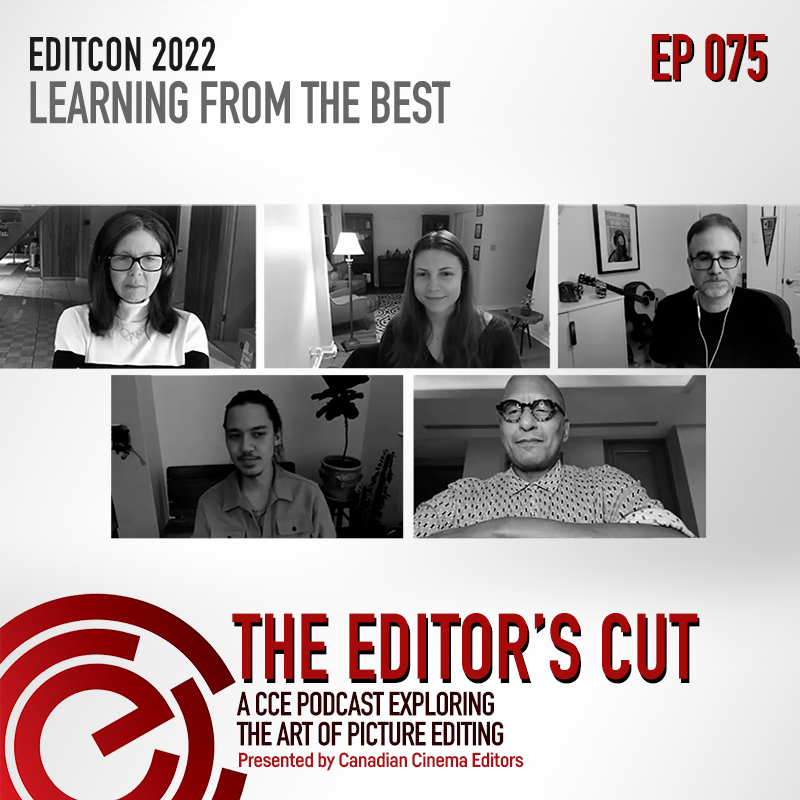

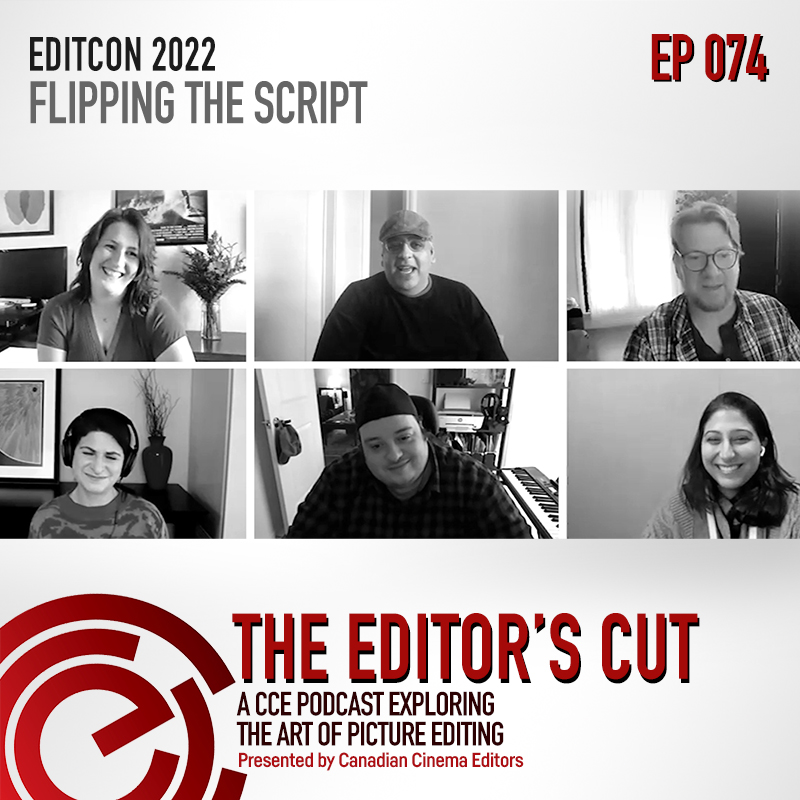

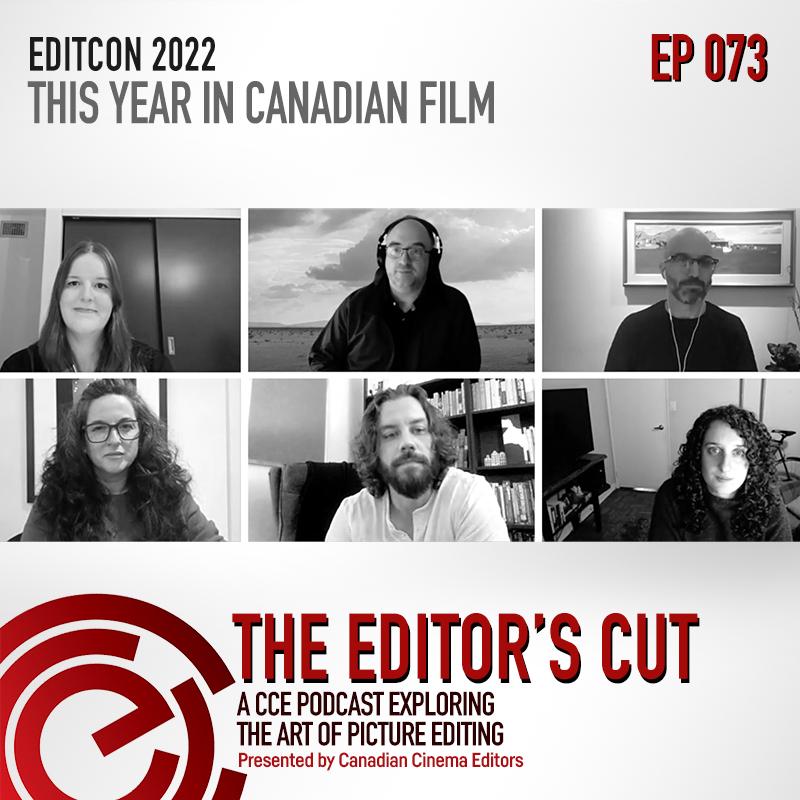


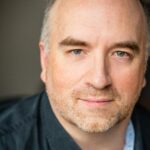
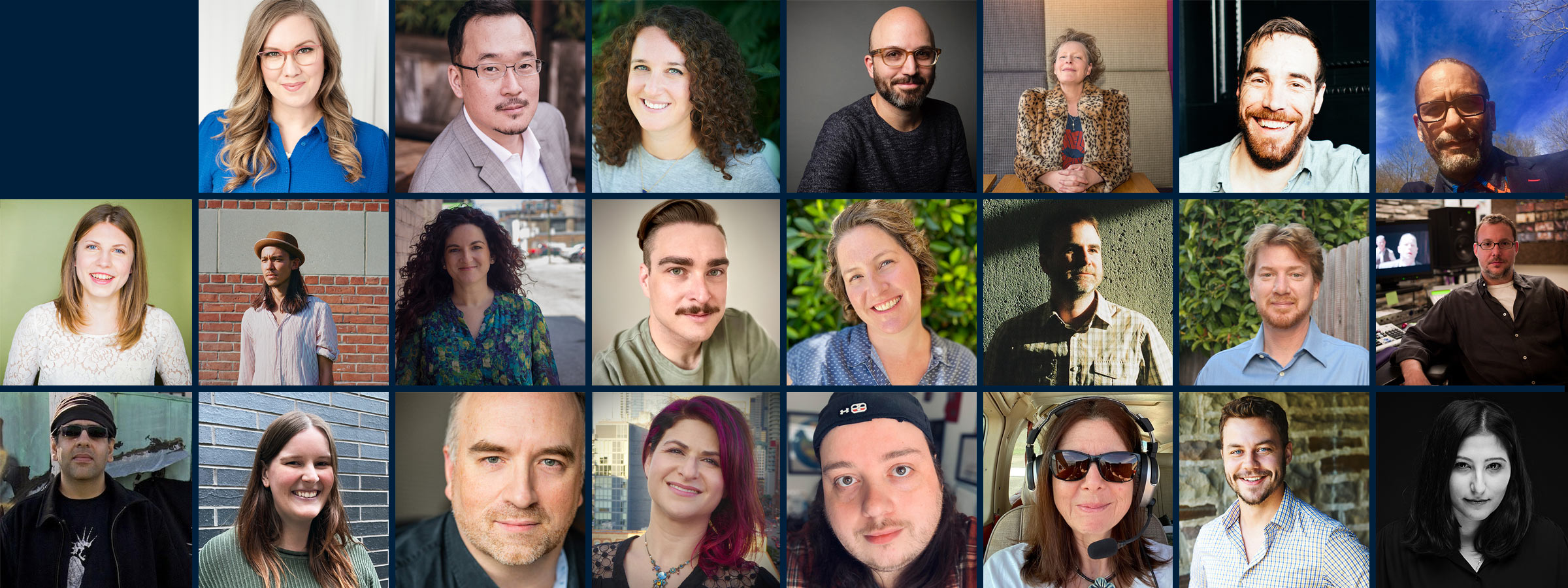

 Simone Smith is an award-winning film and television editor based in Toronto. Past work includes FIRECRACKERS, GOALIE and NEVER STEADY, NEVER STILL. She recently finished work on the Amazon original series THE LAKE. She is currently editing the feature film FLOAT, starring Andrea Bang and Robbie Amell, for Lionsgate.
Simone Smith is an award-winning film and television editor based in Toronto. Past work includes FIRECRACKERS, GOALIE and NEVER STEADY, NEVER STILL. She recently finished work on the Amazon original series THE LAKE. She is currently editing the feature film FLOAT, starring Andrea Bang and Robbie Amell, for Lionsgate.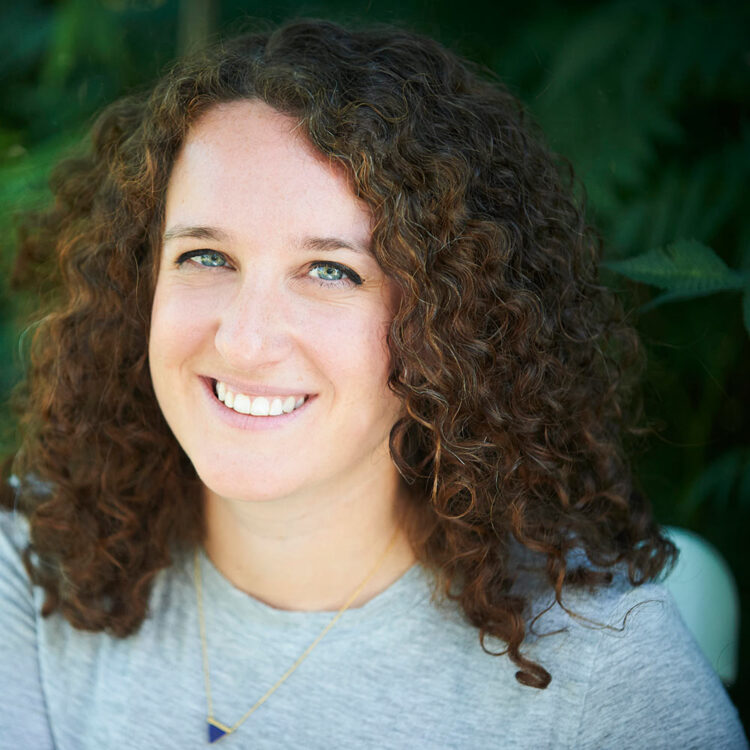 Orlee Buium is an editor with a passion for films with socially conscious content. She has 15 years of experience in the editorial department including assisting on KICK-ASS 2, THE EXPANSE and THE BROKEN HEARTS GALLERY. Her feature credits as an editor include QUEEN OF THE MORNING CALM (nominated for a DGC Editing Award), THE RETREAT (Showtime) and RUN WOMAN RUN. Most recently, Orlee locked picture on Michael McGowan’s latest feature ALL MY PUNY SORROWS, which premiered at TIFF 2021 as a Special Presentation.
Orlee Buium is an editor with a passion for films with socially conscious content. She has 15 years of experience in the editorial department including assisting on KICK-ASS 2, THE EXPANSE and THE BROKEN HEARTS GALLERY. Her feature credits as an editor include QUEEN OF THE MORNING CALM (nominated for a DGC Editing Award), THE RETREAT (Showtime) and RUN WOMAN RUN. Most recently, Orlee locked picture on Michael McGowan’s latest feature ALL MY PUNY SORROWS, which premiered at TIFF 2021 as a Special Presentation.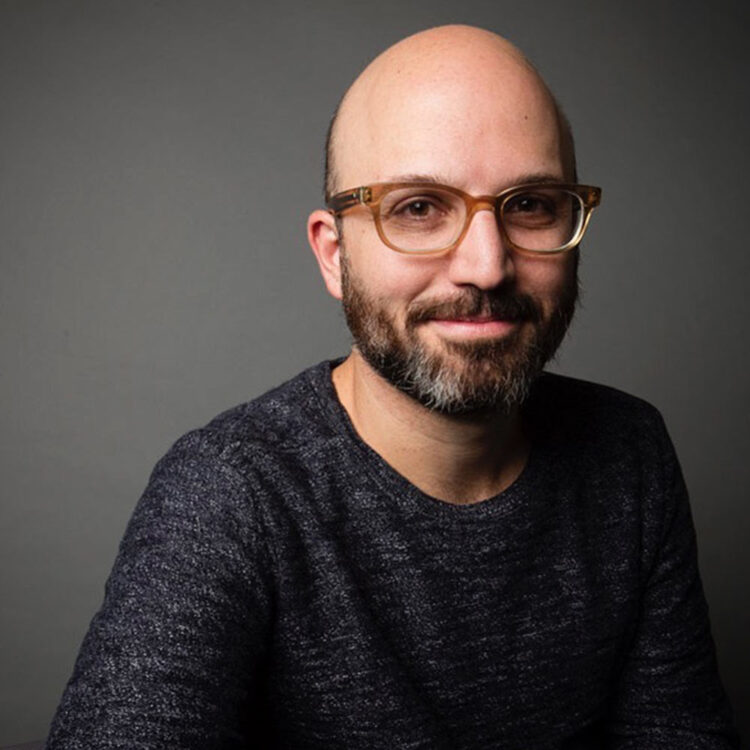 Jorge Weisz, CCE was born and raised in Mexico City and is currently based in Toronto. He has worked on award-winning films such as Peter Stebbings’ EMPIRE OF DIRT, which premiered at TIFF 2013, Michel Franco’s LAS HIJAS DE ABRIL, which won the Un Certain Regard’s Jury Prize at the 2017 Cannes Film Festival, and recently on Danis Goulet’s NIGHT RAIDERS, which premiered at the 2021 Berlinale. Currently, he is teaming up again with Christian Sparkes for the film SWEETLAND.
Jorge Weisz, CCE was born and raised in Mexico City and is currently based in Toronto. He has worked on award-winning films such as Peter Stebbings’ EMPIRE OF DIRT, which premiered at TIFF 2013, Michel Franco’s LAS HIJAS DE ABRIL, which won the Un Certain Regard’s Jury Prize at the 2017 Cannes Film Festival, and recently on Danis Goulet’s NIGHT RAIDERS, which premiered at the 2021 Berlinale. Currently, he is teaming up again with Christian Sparkes for the film SWEETLAND.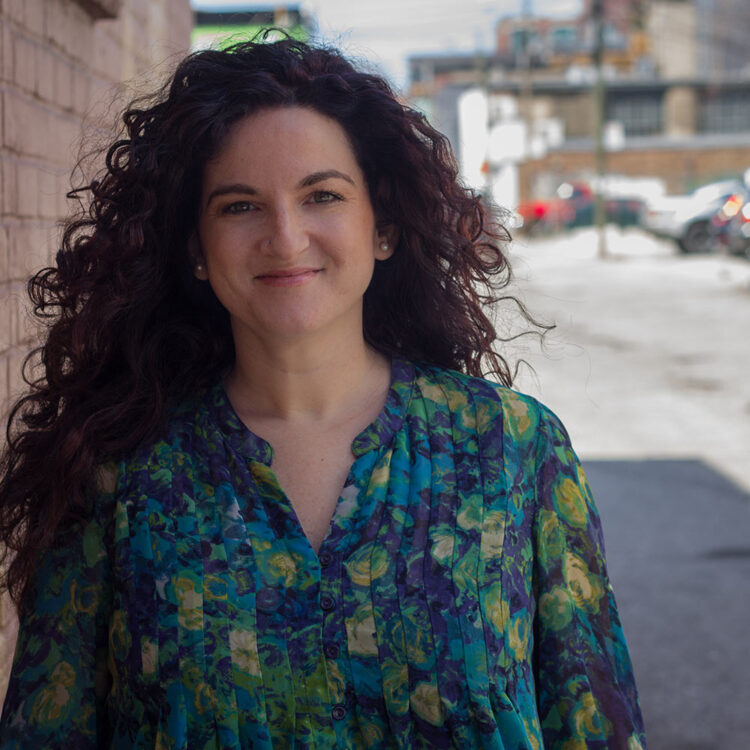 After graduating from the film program at York University, Michelle worked for many years as an assistant editor. This allowed her to be mentored and collaborate with some of the leading forces in Canadian cinema. Her selected film and TV credits include, NATASHA, BELOW HER MOUTH, BETWEEN, UN TRADUCTOR (which premiered at the 2018 Sundance Film Festival) and NORTHERN RESCUE. Her latest film is the DGC Award winning ALL MY PUNY SORROWS, which had its premiere at TIFF in 2021.
After graduating from the film program at York University, Michelle worked for many years as an assistant editor. This allowed her to be mentored and collaborate with some of the leading forces in Canadian cinema. Her selected film and TV credits include, NATASHA, BELOW HER MOUTH, BETWEEN, UN TRADUCTOR (which premiered at the 2018 Sundance Film Festival) and NORTHERN RESCUE. Her latest film is the DGC Award winning ALL MY PUNY SORROWS, which had its premiere at TIFF in 2021.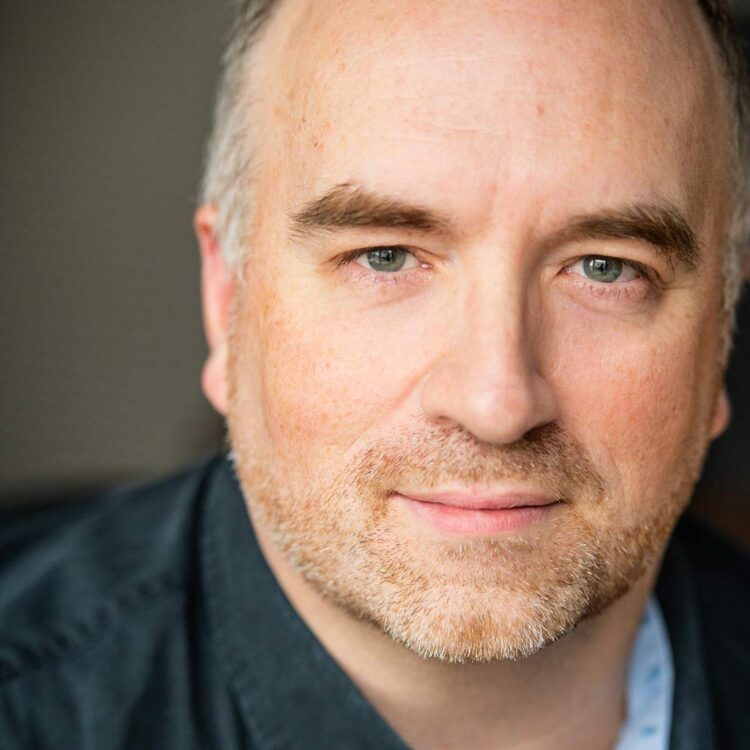 Arthur Tarnowski, ACE is a prolific editor whose work ranges from auteur cinema to popular comedies – with a penchant for action films. His feature credits span many genres and include DRUNKEN BIRDS, BEST SELLERS, THE DECLINE, THE HUMMINGBIRD PROJECT, THE FALL OF THE AMERICAN EMPIRE, THE TROTSKY, BRICK MANSIONS, DEADFALL, WHITEWASH and COMPULSIVE LIAR. His television work includes 19-2, BAD BLOOD, BEING HUMAN, MOHAWK GIRLS, THE MOODYS and VIRAGE. He has also created over 150 film trailers, including some of the biggest Box-office hits in his native Quebec.
Arthur Tarnowski, ACE is a prolific editor whose work ranges from auteur cinema to popular comedies – with a penchant for action films. His feature credits span many genres and include DRUNKEN BIRDS, BEST SELLERS, THE DECLINE, THE HUMMINGBIRD PROJECT, THE FALL OF THE AMERICAN EMPIRE, THE TROTSKY, BRICK MANSIONS, DEADFALL, WHITEWASH and COMPULSIVE LIAR. His television work includes 19-2, BAD BLOOD, BEING HUMAN, MOHAWK GIRLS, THE MOODYS and VIRAGE. He has also created over 150 film trailers, including some of the biggest Box-office hits in his native Quebec. Rich Williamson is an Oscar-shortlisted filmmaker based in Toronto. His work blends the best of fiction and documentary technique together with a focus on social-issue subjects. SCARBOROUGH is his first dramatic feature with partner and co-director Shasha Nakhai. It made its World Premiere at the 2021 Toronto International Film Festival, where it won the Shawn Mendes Foundation Changemaker Award, was 1st runner up for People’s Choice, and received an Honourable Mention for Best Canadian Feature.
Rich Williamson is an Oscar-shortlisted filmmaker based in Toronto. His work blends the best of fiction and documentary technique together with a focus on social-issue subjects. SCARBOROUGH is his first dramatic feature with partner and co-director Shasha Nakhai. It made its World Premiere at the 2021 Toronto International Film Festival, where it won the Shawn Mendes Foundation Changemaker Award, was 1st runner up for People’s Choice, and received an Honourable Mention for Best Canadian Feature.
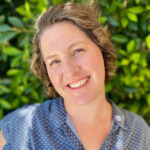
 Gillian is a Toronto-based editor with a diverse career editing drama series, feature films, and MOWs in a variety of genres. She has had the good fortune of working with many prominent and celebrated producers, directors, and screenwriters. Gillian is best known for her work on ORPHAN BLACK, ANNE WITH AN E, and THE EXPANSE. She has won two CSA awards, a DGC award, and has earned twelve award nominations.
Gillian is a Toronto-based editor with a diverse career editing drama series, feature films, and MOWs in a variety of genres. She has had the good fortune of working with many prominent and celebrated producers, directors, and screenwriters. Gillian is best known for her work on ORPHAN BLACK, ANNE WITH AN E, and THE EXPANSE. She has won two CSA awards, a DGC award, and has earned twelve award nominations.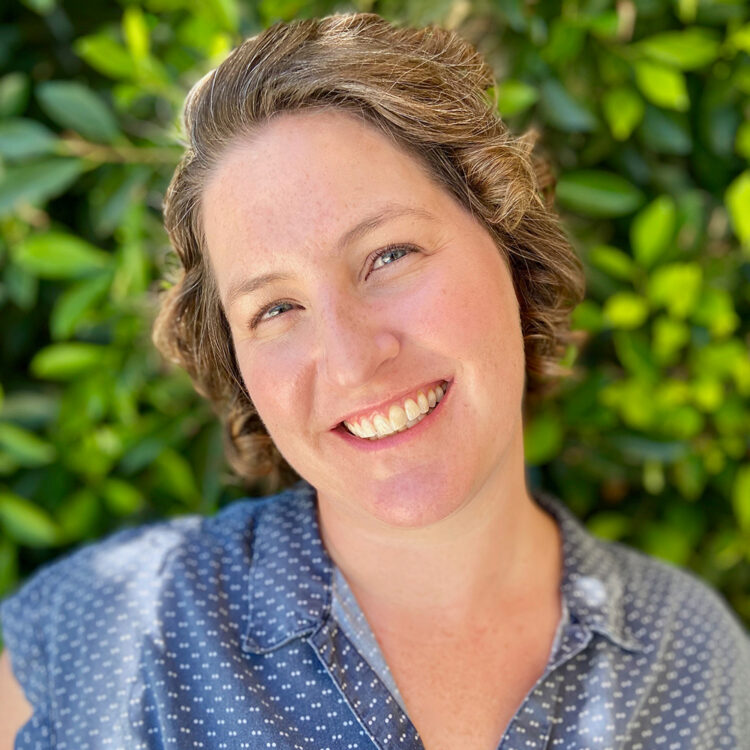 Melissa first fell in love with editing while studying film at Western Michigan University. She then made her way to California and earned a Master’s in Editing from Chapman University Dodge College of Film & Media Arts. In 2007 she earned a coveted internship with ACE, which jump-started her career. Melissa credits include the CW’s LIFE SENTENCE and WHISKEY CAVALIER on ABC. Her work on TED LASSO earned her an Eddie Award and an Emmy nomination in 2021.
Melissa first fell in love with editing while studying film at Western Michigan University. She then made her way to California and earned a Master’s in Editing from Chapman University Dodge College of Film & Media Arts. In 2007 she earned a coveted internship with ACE, which jump-started her career. Melissa credits include the CW’s LIFE SENTENCE and WHISKEY CAVALIER on ABC. Her work on TED LASSO earned her an Eddie Award and an Emmy nomination in 2021.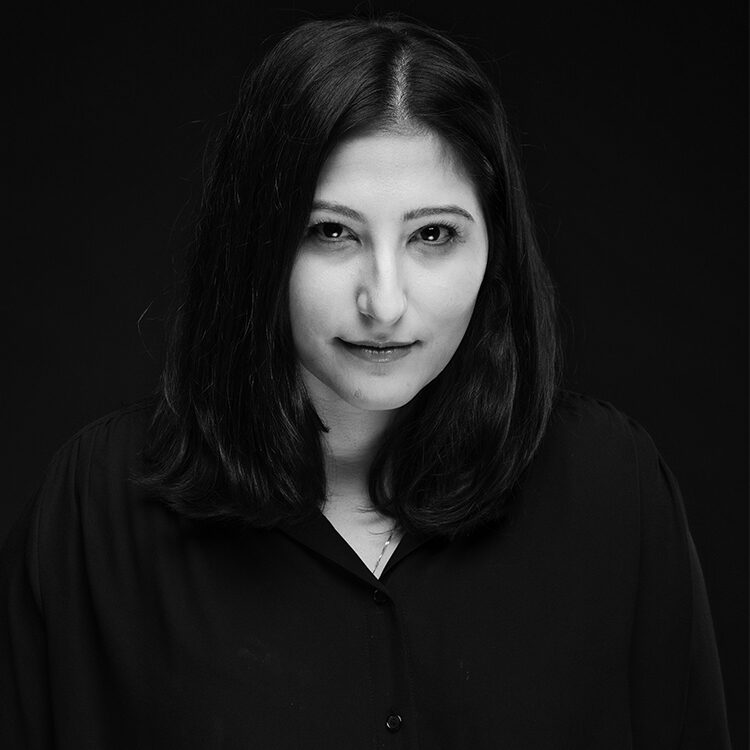 Nona Khodai is an Iranian-American Picture Editor stemming from Southern California. Her most recent credits include Marvel’s WANDAVISION and the Amazon series THE BOYS. Her past editing credits include REVOLUTION, COLONY, THE STRAIN, and AMAZING STORIES. She is currently working on another Disney + series that will be released sometime late this year.
Nona Khodai is an Iranian-American Picture Editor stemming from Southern California. Her most recent credits include Marvel’s WANDAVISION and the Amazon series THE BOYS. Her past editing credits include REVOLUTION, COLONY, THE STRAIN, and AMAZING STORIES. She is currently working on another Disney + series that will be released sometime late this year.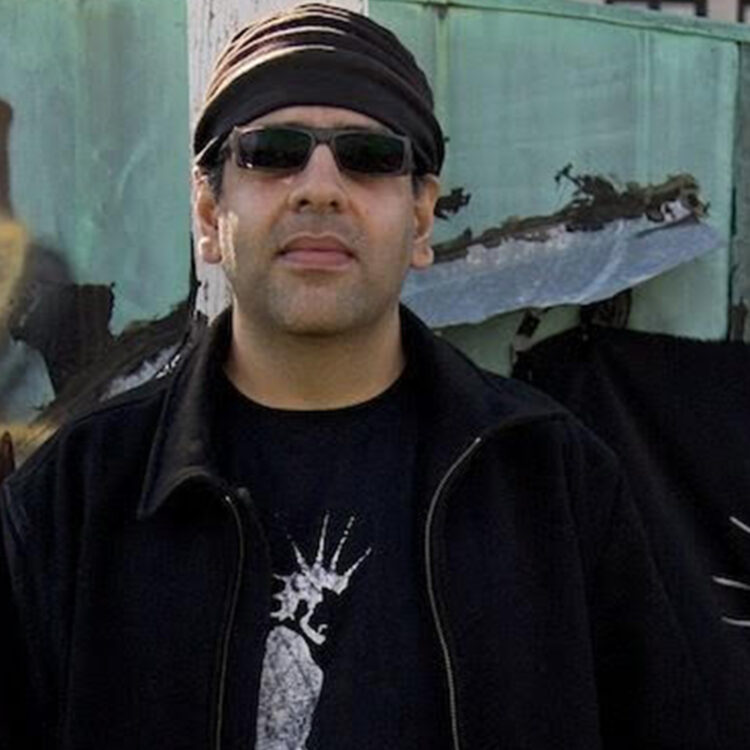 Omar Majeed is a Pakistani-Canadian writer, editor, and filmmaker. His editing credits include THE FRUIT HUNTERS, OMEGA MAN: A WRESTLING LOVE STORY, WORLD IN A CITY, INSIDE LARA ROXX, THE ARTISTS: THE PIONEERS BEHIND THE PIXELS and SORT OF. In 2018 he received a CSA for his work on THE ARTISTS and in 2001 for QUEERTELEVISION. Although he’s called many cities home including Montréal, Baltimore, and Lahore, Omar currently resides in Toronto with his wife and young child.
Omar Majeed is a Pakistani-Canadian writer, editor, and filmmaker. His editing credits include THE FRUIT HUNTERS, OMEGA MAN: A WRESTLING LOVE STORY, WORLD IN A CITY, INSIDE LARA ROXX, THE ARTISTS: THE PIONEERS BEHIND THE PIXELS and SORT OF. In 2018 he received a CSA for his work on THE ARTISTS and in 2001 for QUEERTELEVISION. Although he’s called many cities home including Montréal, Baltimore, and Lahore, Omar currently resides in Toronto with his wife and young child.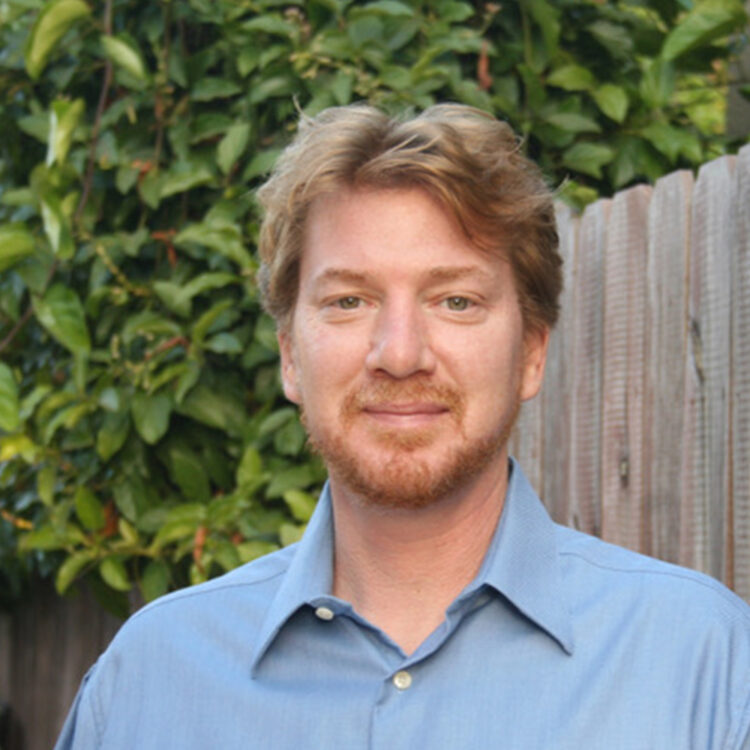 Jim Flynn is an American born Editor. He studied film at Emerson college in Boston. He then moved to Los Angeles where he began working as an Assistant Editor. Teaming up with Alan Heim on Nick Cassavetes’ ALPHA DOG he began his transition to Editor. He edited several more films with Cassavetes including MY SISTERS KEEPER and THE OTHER WOMAN. Most recently, Jim has been editing Netflix series, including THE HAUNTING OF HILL HOUSE and BRIDGERTON.
Jim Flynn is an American born Editor. He studied film at Emerson college in Boston. He then moved to Los Angeles where he began working as an Assistant Editor. Teaming up with Alan Heim on Nick Cassavetes’ ALPHA DOG he began his transition to Editor. He edited several more films with Cassavetes including MY SISTERS KEEPER and THE OTHER WOMAN. Most recently, Jim has been editing Netflix series, including THE HAUNTING OF HILL HOUSE and BRIDGERTON.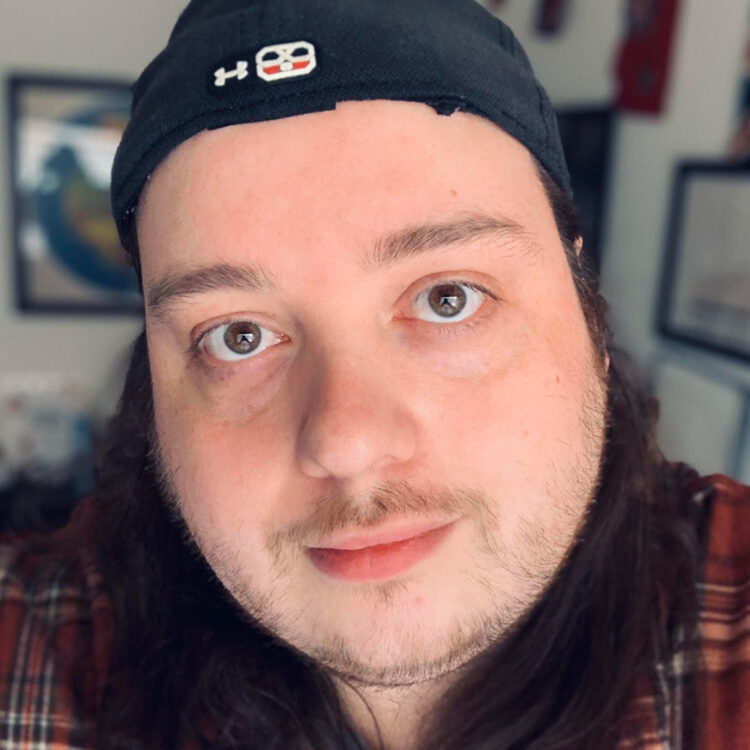 Sam is a picture and animatic editor based in Toronto, with over a decade of experience in scripted storytelling. In addition to SORT OF, his credits include the award-winning series SAVE ME AND FOR THE RECORD, CORNER GAS ANIMATED, and animated specials for BLACK-ISH and ONE DAY AT A TIME. Sam is a proud member of the Director’s Guild of Canada, The Academy of Canadian Film and Television, and the Canadian Cinema Editors.
Sam is a picture and animatic editor based in Toronto, with over a decade of experience in scripted storytelling. In addition to SORT OF, his credits include the award-winning series SAVE ME AND FOR THE RECORD, CORNER GAS ANIMATED, and animated specials for BLACK-ISH and ONE DAY AT A TIME. Sam is a proud member of the Director’s Guild of Canada, The Academy of Canadian Film and Television, and the Canadian Cinema Editors.
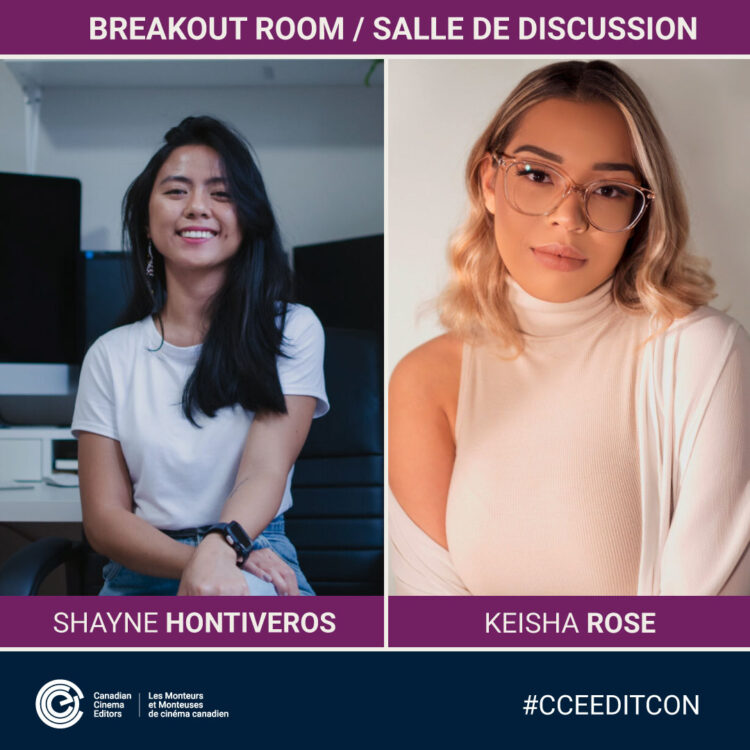 Fast thinking, deep technical skill and knowing your shortcuts are just some of what is needed to be a great Assistant Editor. Join the Assistant Editors behind COMPANY TOWN, BIG BROTHER CANADA, SCARBOROUGH and THE PORTER to ask your questions, get some answers and have a great time.
Fast thinking, deep technical skill and knowing your shortcuts are just some of what is needed to be a great Assistant Editor. Join the Assistant Editors behind COMPANY TOWN, BIG BROTHER CANADA, SCARBOROUGH and THE PORTER to ask your questions, get some answers and have a great time.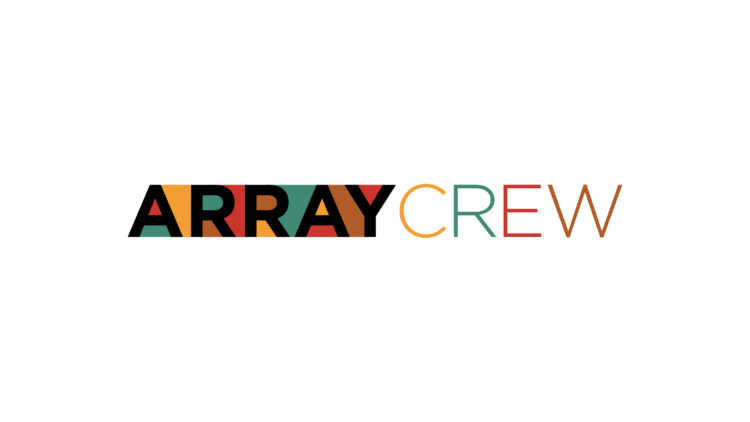 Created by filmmaker Ava DuVernay and led by an all-women executive team, ARRAY Crew is a personnel database, to ensure that studio executives, department heads and producers are able to access a robust pipeline of qualified below-the-line women, people of color and those from underrepresented backgrounds to staff their television and film crews. ARRAY Crew is partnered with all of the major Hollywood studios and streamers and has recently expanded to Canada. Join ARRAY Crew’s Director of Industry Relations, Meredith Shea, for an exclusive conversation with Editing Crew Members and Studio Executives.
Created by filmmaker Ava DuVernay and led by an all-women executive team, ARRAY Crew is a personnel database, to ensure that studio executives, department heads and producers are able to access a robust pipeline of qualified below-the-line women, people of color and those from underrepresented backgrounds to staff their television and film crews. ARRAY Crew is partnered with all of the major Hollywood studios and streamers and has recently expanded to Canada. Join ARRAY Crew’s Director of Industry Relations, Meredith Shea, for an exclusive conversation with Editing Crew Members and Studio Executives.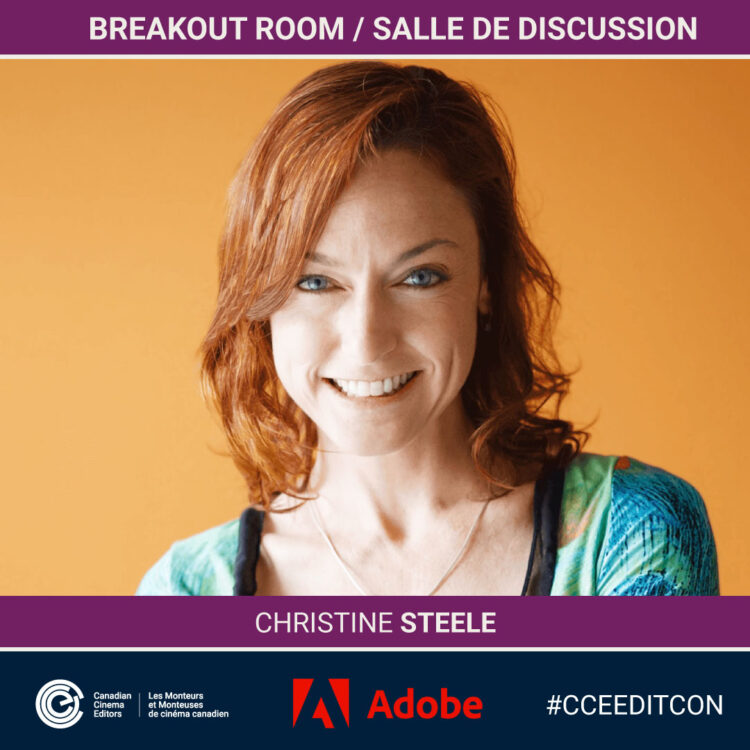 Tell richer stories and evoke a mood using some of the powerful color and effects tools in Adobe Premiere Pro. Join editor, director, and producer Christine Steele to explore filmmaking techniques that make your video look and feel more cinematic. Discover how to edit video to inspire emotion and hook the viewer.
Tell richer stories and evoke a mood using some of the powerful color and effects tools in Adobe Premiere Pro. Join editor, director, and producer Christine Steele to explore filmmaking techniques that make your video look and feel more cinematic. Discover how to edit video to inspire emotion and hook the viewer.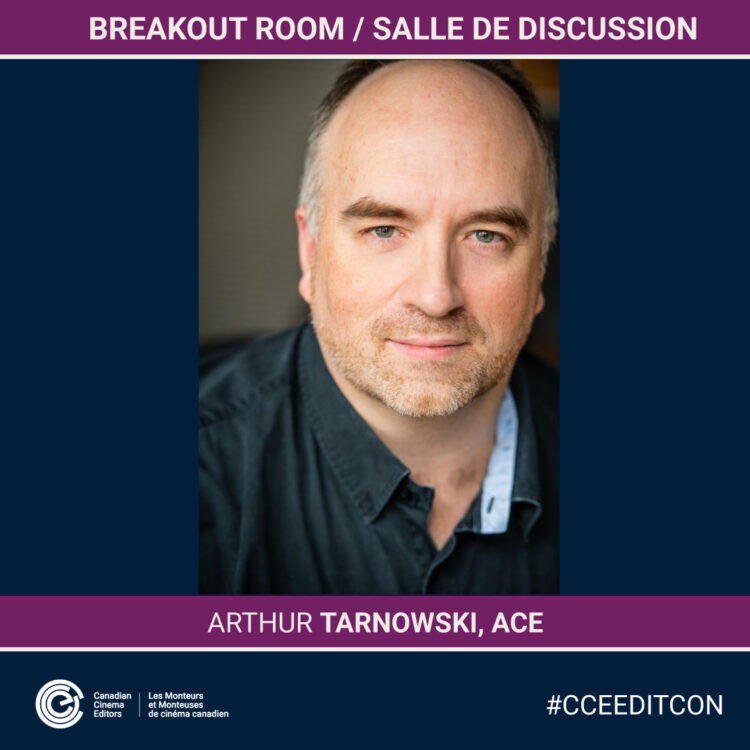 Join the veteran editor behind DRUNKEN BIRDS to discuss his latest film, answer your burning questions, and talk about all things editing. Arthur’s extensive experience spans almost 3 decades, and includes documentary & narrative film of all genres, television, shorts and trailer editing. Don’t miss this chance to pick the brain of a master of the craft. This panel will run in English but questions in French are welcome and encouraged.
Join the veteran editor behind DRUNKEN BIRDS to discuss his latest film, answer your burning questions, and talk about all things editing. Arthur’s extensive experience spans almost 3 decades, and includes documentary & narrative film of all genres, television, shorts and trailer editing. Don’t miss this chance to pick the brain of a master of the craft. This panel will run in English but questions in French are welcome and encouraged. Pull up a seat, bring your questions and settle in for a riveting conversation with the editorial maven of NIGHT RAIDERS. Jorge’s knowledge and passion for film is boundless; his storytelling expertise runs deep. His prolific work in feature films over the past eleven years has continuously brought one festival hit after another. This conversation is a must for those interested in narrative feature editing.
Pull up a seat, bring your questions and settle in for a riveting conversation with the editorial maven of NIGHT RAIDERS. Jorge’s knowledge and passion for film is boundless; his storytelling expertise runs deep. His prolific work in feature films over the past eleven years has continuously brought one festival hit after another. This conversation is a must for those interested in narrative feature editing.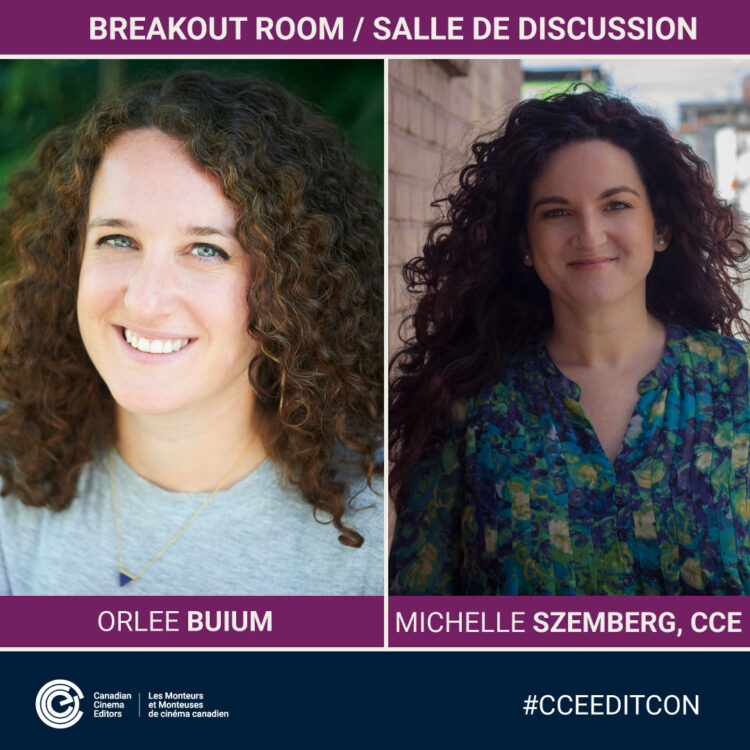 Spend some quality time with the brilliant dynamic duo behind ALL MY PUNY SORROWS. Michelle and Orlee will answer all your questions about their processes co-editing this award winning film, which marks their second outing as co-editors. Between them these two share over thirty years of experience in post production, from assistant editing to editing, these two know it all. This is a conversation you won’t want to miss.
Spend some quality time with the brilliant dynamic duo behind ALL MY PUNY SORROWS. Michelle and Orlee will answer all your questions about their processes co-editing this award winning film, which marks their second outing as co-editors. Between them these two share over thirty years of experience in post production, from assistant editing to editing, these two know it all. This is a conversation you won’t want to miss.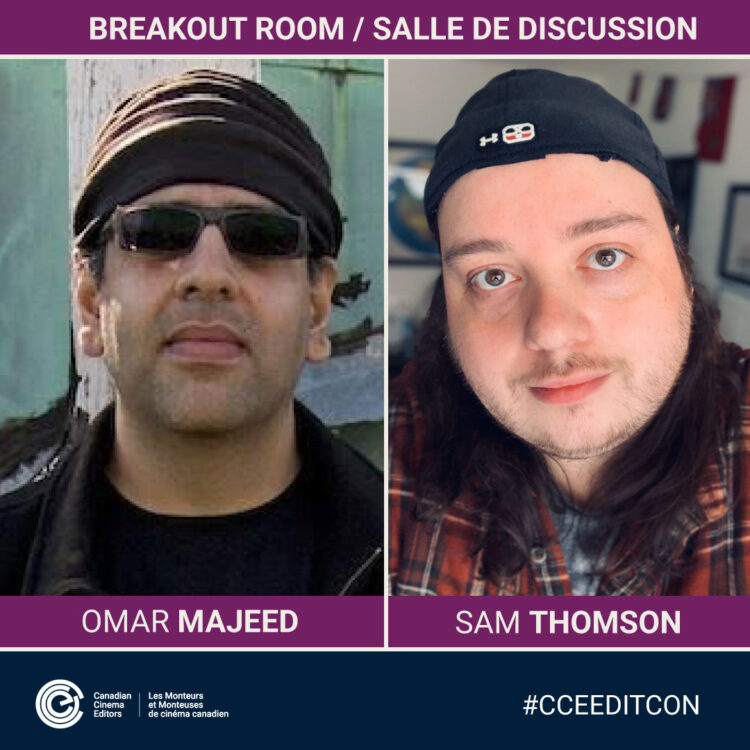 Get comfortable with two of the editors of SORT OF as Omar and Sam answer your questions, queries, and curiosities. These great minds have extensive experience editing television, documentary, animation, and much more. Dig deeper into their experiences working on this game changing series in this intimate setting.
Get comfortable with two of the editors of SORT OF as Omar and Sam answer your questions, queries, and curiosities. These great minds have extensive experience editing television, documentary, animation, and much more. Dig deeper into their experiences working on this game changing series in this intimate setting.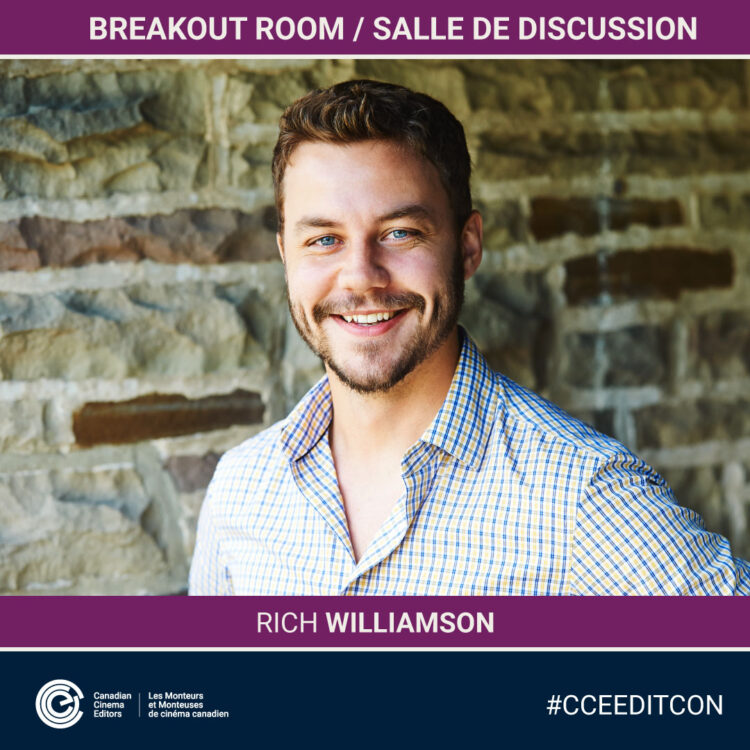 Enjoy some time with the unique talent behind the breakout film, SCARBOROUGH, a film which Rich co-directed as well as edited. Rich has a deep understanding of documentary and short film. His latest film marks his first foray into editing fiction. Dive in, ask your questions, and get insights into the unique process behind this great film.
Enjoy some time with the unique talent behind the breakout film, SCARBOROUGH, a film which Rich co-directed as well as edited. Rich has a deep understanding of documentary and short film. His latest film marks his first foray into editing fiction. Dive in, ask your questions, and get insights into the unique process behind this great film.
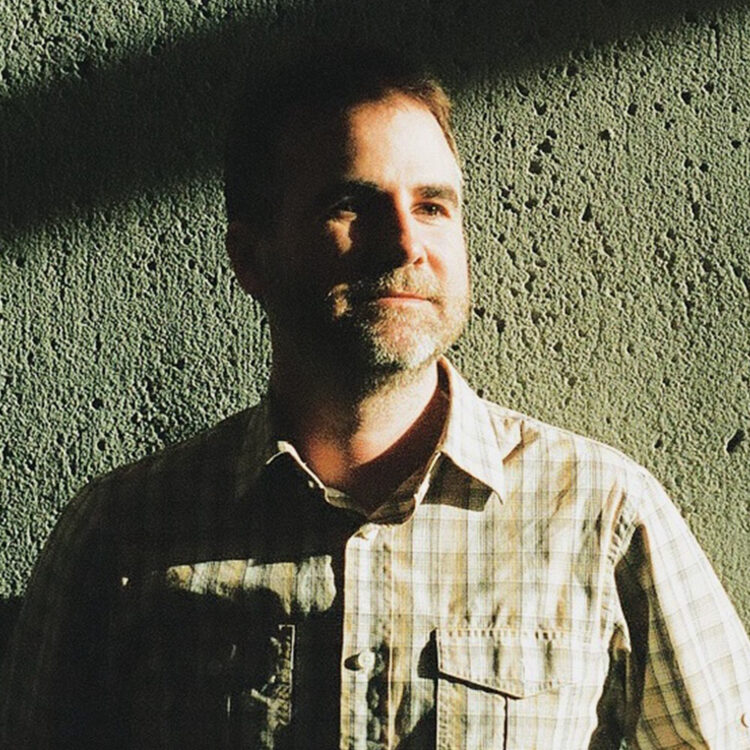 Chris is a Toronto-based film and television editor. His credits include four films which premiered at the Toronto International Film Festival (TIFF) including EASY LAND, PORCUPINE LAKE, CLEO and SILAS. The film LUBA won the Audience Choice Award at the Canadian Film Fest and earned Chris a CCE award nomination. Chris’ television work includes four seasons of the Emmy nominated and CSA winning Hulu series HOLLY HOBBIE, CBC Gem comedy THE COMMUNIST’S DAUGHTER, and music documentary series ON THE RECORD.
Chris is a Toronto-based film and television editor. His credits include four films which premiered at the Toronto International Film Festival (TIFF) including EASY LAND, PORCUPINE LAKE, CLEO and SILAS. The film LUBA won the Audience Choice Award at the Canadian Film Fest and earned Chris a CCE award nomination. Chris’ television work includes four seasons of the Emmy nominated and CSA winning Hulu series HOLLY HOBBIE, CBC Gem comedy THE COMMUNIST’S DAUGHTER, and music documentary series ON THE RECORD. With two films on the Oscar shortlist, multiple award winning Michèle Hozer has been working as a filmmaker and editor since 1987. PROMISE TO THE DEAD picked up her first Emmy nomination and her co-directorial debut of GENIUS WITHIN: THE INNER LIFE OF GLENN GOULD was on the Oscar shortlist. In 2015 Michèle completed SUGAR COATED which won The Donald Brittain Award at the CSAs. Today Michèle is exploring new adventures in Prince Edward County as story editor on multiple projects including Buffy Sainte Marie’s feature length doc.
With two films on the Oscar shortlist, multiple award winning Michèle Hozer has been working as a filmmaker and editor since 1987. PROMISE TO THE DEAD picked up her first Emmy nomination and her co-directorial debut of GENIUS WITHIN: THE INNER LIFE OF GLENN GOULD was on the Oscar shortlist. In 2015 Michèle completed SUGAR COATED which won The Donald Brittain Award at the CSAs. Today Michèle is exploring new adventures in Prince Edward County as story editor on multiple projects including Buffy Sainte Marie’s feature length doc.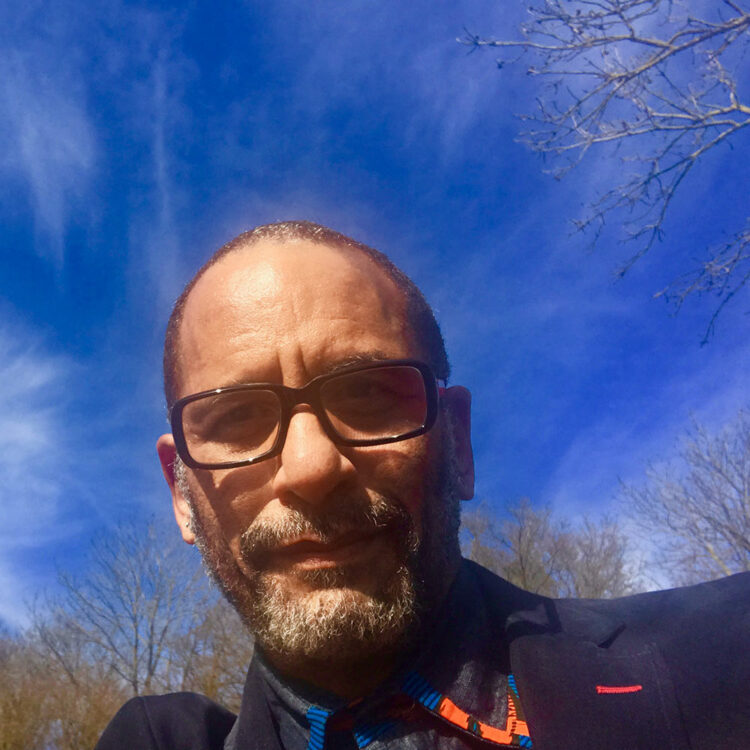 Ricardo has been working in the film industry for over 25 years. He has been awarded with an Emmy, and has been nominated several times to Genie, Gemini, CCE and CS Awards Ricardo came to Canada from his native Cuba in 1993, where he studied and worked at the world-renowned Cuban Film Institute in Havana. His outstanding work and keen sense of the human condition has contributed to the making of several award-winning and award-nominated films. Some credits include: 15 TO LIFE, MARMATO, THE SILENCE OF OTHERS and HERMAN’S HOUSE.
Ricardo has been working in the film industry for over 25 years. He has been awarded with an Emmy, and has been nominated several times to Genie, Gemini, CCE and CS Awards Ricardo came to Canada from his native Cuba in 1993, where he studied and worked at the world-renowned Cuban Film Institute in Havana. His outstanding work and keen sense of the human condition has contributed to the making of several award-winning and award-nominated films. Some credits include: 15 TO LIFE, MARMATO, THE SILENCE OF OTHERS and HERMAN’S HOUSE.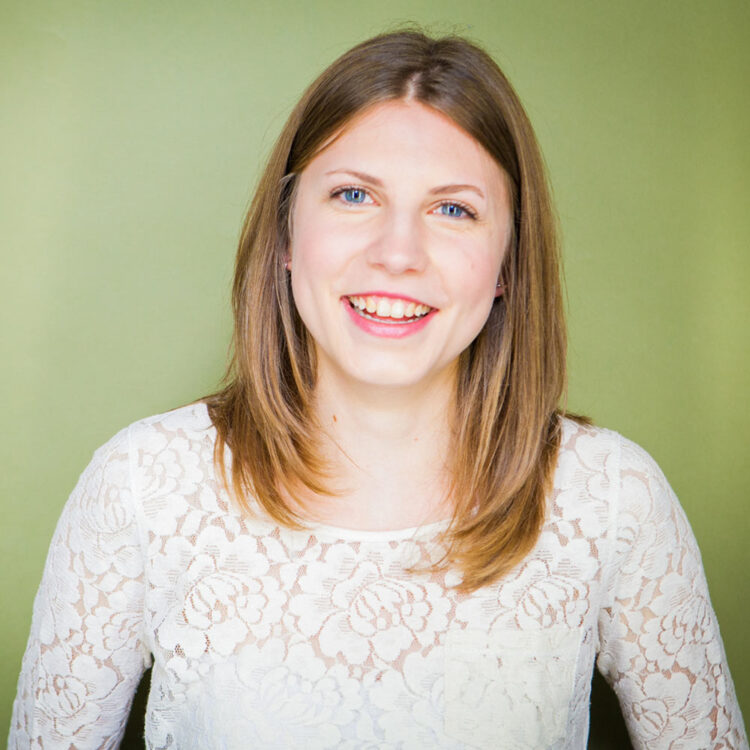 Brina Romanek is a documentary filmmaker and editor. She has directed work for True Calling Media, RogersTV and CBC Short Docs. As an editor Brina has worked on films that have aired on Zoomer Media, Crave TV, The Travel Channel, TVO and CBC. Most recently, Brina had the honour of working with the team at Cream Productions to create the two part horror doc series BATHSHEBA. Brina is also the resident audio editor for the Indigenous Climate Action Podcast.
Brina Romanek is a documentary filmmaker and editor. She has directed work for True Calling Media, RogersTV and CBC Short Docs. As an editor Brina has worked on films that have aired on Zoomer Media, Crave TV, The Travel Channel, TVO and CBC. Most recently, Brina had the honour of working with the team at Cream Productions to create the two part horror doc series BATHSHEBA. Brina is also the resident audio editor for the Indigenous Climate Action Podcast.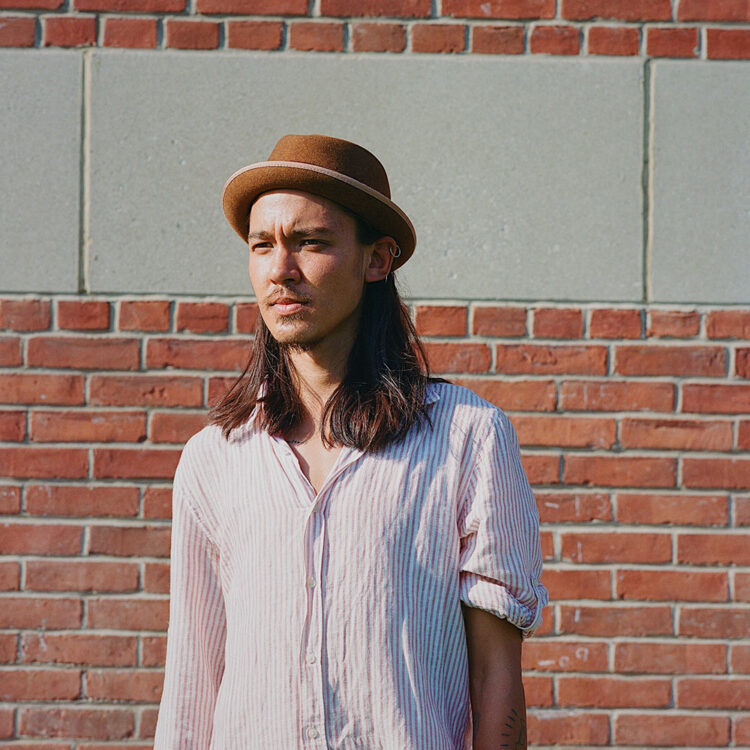 Jordan Kawai is a documentary film editor based in Toronto. He has edited for both short form (BOAT PEOPLE) and feature documentary film (CHANNEL’S STAGE: THE CULINARY INTERNSHIP and BANGLA SURF GIRLS), as well as video installation (NOTES FROM THE UNDERGROUND). Jordan holds an MFA in Documentary Media Studies from Ryerson University and was a participant in the Mentorship program at the Montreal International Documentary Festival. His personal film work explores family lore and narratives of Japanese Canadian Internment.
Jordan Kawai is a documentary film editor based in Toronto. He has edited for both short form (BOAT PEOPLE) and feature documentary film (CHANNEL’S STAGE: THE CULINARY INTERNSHIP and BANGLA SURF GIRLS), as well as video installation (NOTES FROM THE UNDERGROUND). Jordan holds an MFA in Documentary Media Studies from Ryerson University and was a participant in the Mentorship program at the Montreal International Documentary Festival. His personal film work explores family lore and narratives of Japanese Canadian Internment.

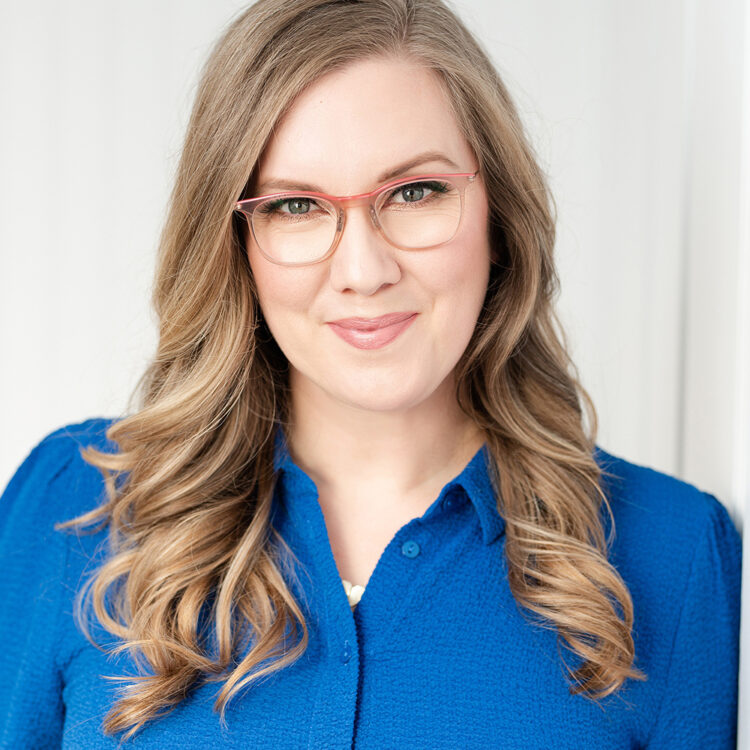 Sarah Taylor is a multi-award winning editor with over nineteen years of experience. She has cut a wide range of documentaries, television programs, short and feature films. Sarah strives to help shape unique stories from unheard voices. Her work has been seen in festivals around the world including Sundance. She is a member of the Directors Guild of Canada (DGC), on the board of The Canadian Cinema Editors (CCE) and is the host of the CCE podcast The Editor’s Cut.
Sarah Taylor is a multi-award winning editor with over nineteen years of experience. She has cut a wide range of documentaries, television programs, short and feature films. Sarah strives to help shape unique stories from unheard voices. Her work has been seen in festivals around the world including Sundance. She is a member of the Directors Guild of Canada (DGC), on the board of The Canadian Cinema Editors (CCE) and is the host of the CCE podcast The Editor’s Cut. Elísabet Ronaldsdóttir was born and raised in Reykjavik, Iceland. She has edited over 40 feature films, television programs, and documentaries, as well as an animated feature film. Her editing work also includes active industry participation. She is best known for her collaborations with film directors David Leitch for JOHN WICK, ATOMIC BLONDE, DEADPOOL 2 and the upcoming film BULLET TRAIN. She recently partnered with director Destin Daniel Cretton on the Marvel film SHANG-CHI AND THE LEGEND OF THE TEN RINGS.
Elísabet Ronaldsdóttir was born and raised in Reykjavik, Iceland. She has edited over 40 feature films, television programs, and documentaries, as well as an animated feature film. Her editing work also includes active industry participation. She is best known for her collaborations with film directors David Leitch for JOHN WICK, ATOMIC BLONDE, DEADPOOL 2 and the upcoming film BULLET TRAIN. She recently partnered with director Destin Daniel Cretton on the Marvel film SHANG-CHI AND THE LEGEND OF THE TEN RINGS.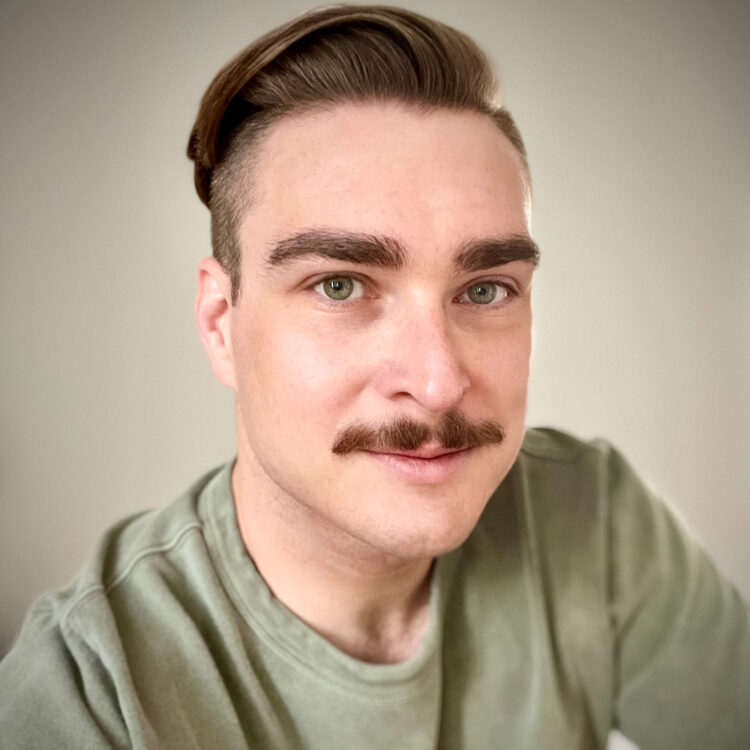 Nathan Orloff is an American film editor and Chapman University graduate. Raised in Seattle, Orloff began his career at JJ Abrams’ BAD ROBOT Productions. His time there includes work as Associate Editor on 10 CLOVERFIELD LANE and Digital Intermediate Supervisor on STAR WARS: THE FORCE AWAKENS. Since his breakout, Orloff became a frequent collaborator with director Jason Reitman, notably cemented through TULLY and THE FRONT RUNNER. Orloff’s most recent work includes editing credits on PLAN B and GHOSTBUSTERS: AFTERLIFE.
Nathan Orloff is an American film editor and Chapman University graduate. Raised in Seattle, Orloff began his career at JJ Abrams’ BAD ROBOT Productions. His time there includes work as Associate Editor on 10 CLOVERFIELD LANE and Digital Intermediate Supervisor on STAR WARS: THE FORCE AWAKENS. Since his breakout, Orloff became a frequent collaborator with director Jason Reitman, notably cemented through TULLY and THE FRONT RUNNER. Orloff’s most recent work includes editing credits on PLAN B and GHOSTBUSTERS: AFTERLIFE.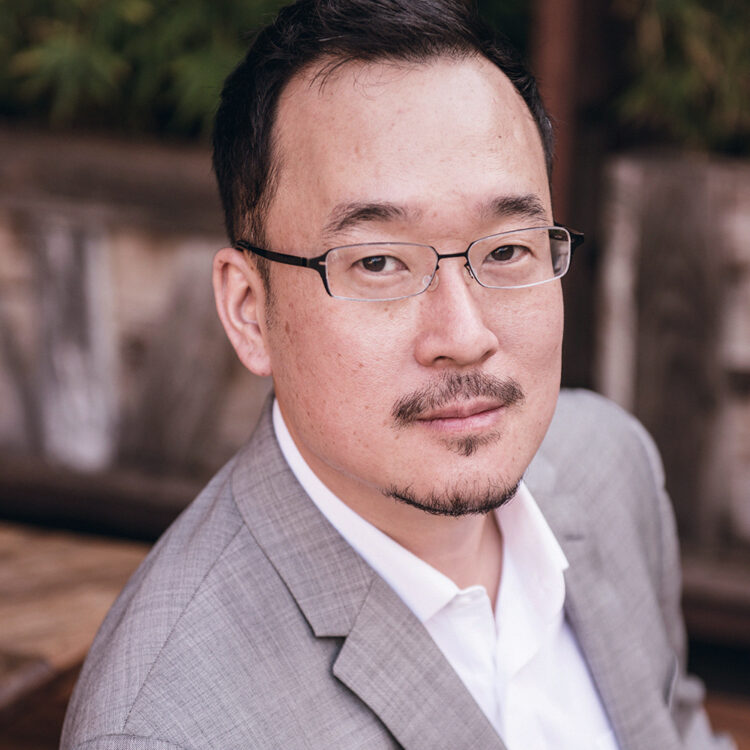 Harry Yoon is a Korean American editor based in Los Angeles. Yoon’s previous credits include SHANG-CHI AND THE LEGEND OF THE TEN RINGS, MINARI, EUPHORIA, THE NEWSROOM, DRUNKTOWN’S FINEST, HALF-LIFE, DETROIT, THE BEST OF ENEMIES and THE LAST BLACK MAN IN SAN FRANCISCO. Yoon has also worked as a VFX editor and assistant editor on ZERO DARK THIRTY, THE REVENANT, THE HUNGER GAMES, FOOTLOOSE, THE CRAZIES and LORD OF DOGTOWN.
Harry Yoon is a Korean American editor based in Los Angeles. Yoon’s previous credits include SHANG-CHI AND THE LEGEND OF THE TEN RINGS, MINARI, EUPHORIA, THE NEWSROOM, DRUNKTOWN’S FINEST, HALF-LIFE, DETROIT, THE BEST OF ENEMIES and THE LAST BLACK MAN IN SAN FRANCISCO. Yoon has also worked as a VFX editor and assistant editor on ZERO DARK THIRTY, THE REVENANT, THE HUNGER GAMES, FOOTLOOSE, THE CRAZIES and LORD OF DOGTOWN.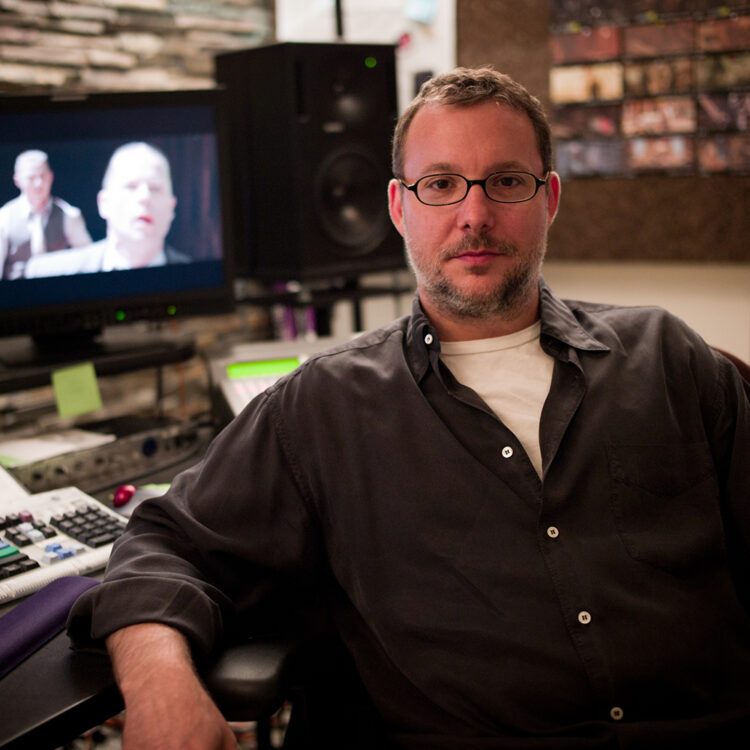 Dylan Tichenor, ACE got his start in editing as an assistant on Robert Altman films including: THE PLAYER, SHORT CUTS, PRÊT-À-PORTER, KANSAS CITY, and as co-editor on the documentary JAZZ ’34. His credits as editor include: BOOGIE NIGHTS, MAGNOLIA, THERE WILL BE BLOOD, UNBREAKABLE, THE ROYAL TENENBAUMS, BROKEBACK MOUNTAIN, THE ASSASSINATION OF JESSE JAMES BY THE COWARD ROBERT FORD, DOUBT, WHIP IT, THE TOWN, LAWLESS and ZERO DARK THIRTY. Recent projects include: PHANTOM THREAD, ANTLERS and ETERNALS.
Dylan Tichenor, ACE got his start in editing as an assistant on Robert Altman films including: THE PLAYER, SHORT CUTS, PRÊT-À-PORTER, KANSAS CITY, and as co-editor on the documentary JAZZ ’34. His credits as editor include: BOOGIE NIGHTS, MAGNOLIA, THERE WILL BE BLOOD, UNBREAKABLE, THE ROYAL TENENBAUMS, BROKEBACK MOUNTAIN, THE ASSASSINATION OF JESSE JAMES BY THE COWARD ROBERT FORD, DOUBT, WHIP IT, THE TOWN, LAWLESS and ZERO DARK THIRTY. Recent projects include: PHANTOM THREAD, ANTLERS and ETERNALS.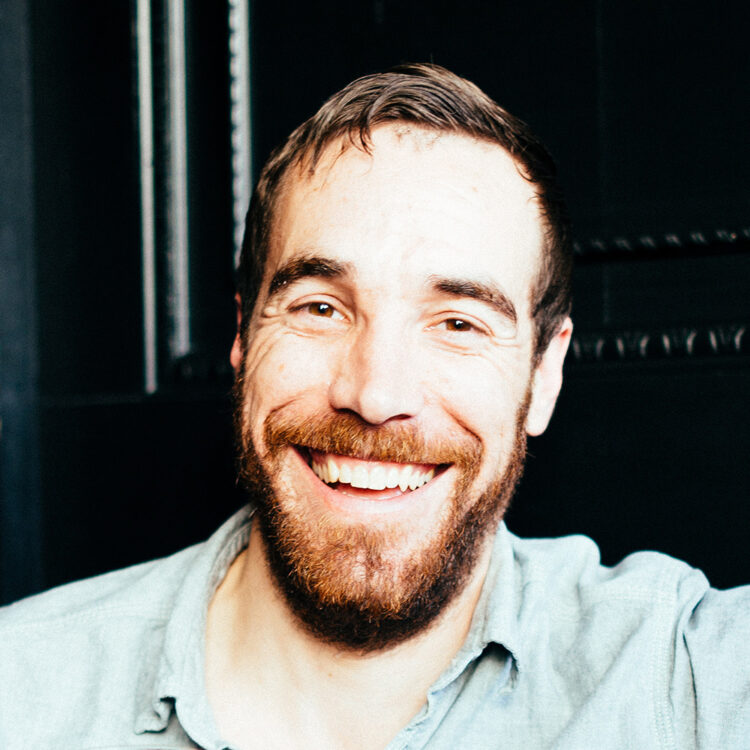 Nat Sanders, ACE has edited a range of acclaimed films such as MOONLIGHT, SHORT TERM 12 and IF BEALE STREET COULD TALK. He is a two-time winner of the Independent Spirit Award and was nominated for an Academy Award for his work on MOONLIGHT. SHANG-CHI AND THE LEGEND OF THE TEN RINGS marks his fourth collaboration with writer/director Destin Daniel Cretton, following his work on JUST MERCY, THE GLASS CASTLE and SHORT TERM 12. Other credits include: MEDICINE FOR MELANCHOLY, YOUR SISTER’S SISTER, HUMPDAY, GIRLS and TOGETHERNESS.
Nat Sanders, ACE has edited a range of acclaimed films such as MOONLIGHT, SHORT TERM 12 and IF BEALE STREET COULD TALK. He is a two-time winner of the Independent Spirit Award and was nominated for an Academy Award for his work on MOONLIGHT. SHANG-CHI AND THE LEGEND OF THE TEN RINGS marks his fourth collaboration with writer/director Destin Daniel Cretton, following his work on JUST MERCY, THE GLASS CASTLE and SHORT TERM 12. Other credits include: MEDICINE FOR MELANCHOLY, YOUR SISTER’S SISTER, HUMPDAY, GIRLS and TOGETHERNESS.
 Stories are powerful; they teach; they hold language, community and culture. They also tie the past to the present and the present to the future. Join Tania Choueiri and Elie-John Joseph from Wapikoni as they discuss narrative sovereignty and the importance of it within indigenous storytelling.
Stories are powerful; they teach; they hold language, community and culture. They also tie the past to the present and the present to the future. Join Tania Choueiri and Elie-John Joseph from Wapikoni as they discuss narrative sovereignty and the importance of it within indigenous storytelling.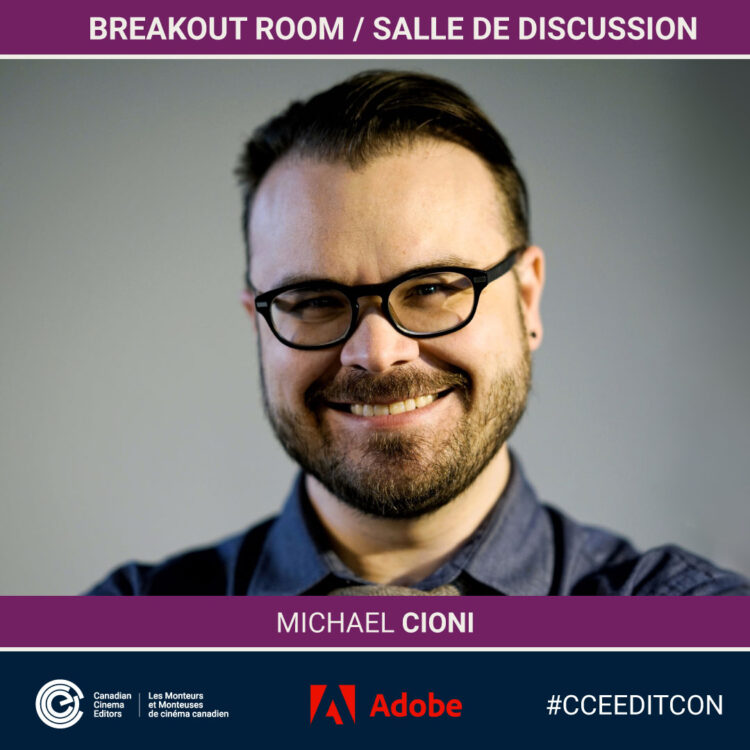 Frame.io Camera to Cloud (C2C) enables footage to be delivered instantly from set to editorial. It’s a whole new way of working that lets everyone from editors to producers and other key stakeholders provide real-time collaborative feedback during production. In this interactive demo, you’ll learn how easily C2C enables production to automatically transmit proxies, audio, camera reports, and more — as soon as the Director calls “cut.” Once you use C2C, you’ll wonder how you worked any other way.
Frame.io Camera to Cloud (C2C) enables footage to be delivered instantly from set to editorial. It’s a whole new way of working that lets everyone from editors to producers and other key stakeholders provide real-time collaborative feedback during production. In this interactive demo, you’ll learn how easily C2C enables production to automatically transmit proxies, audio, camera reports, and more — as soon as the Director calls “cut.” Once you use C2C, you’ll wonder how you worked any other way.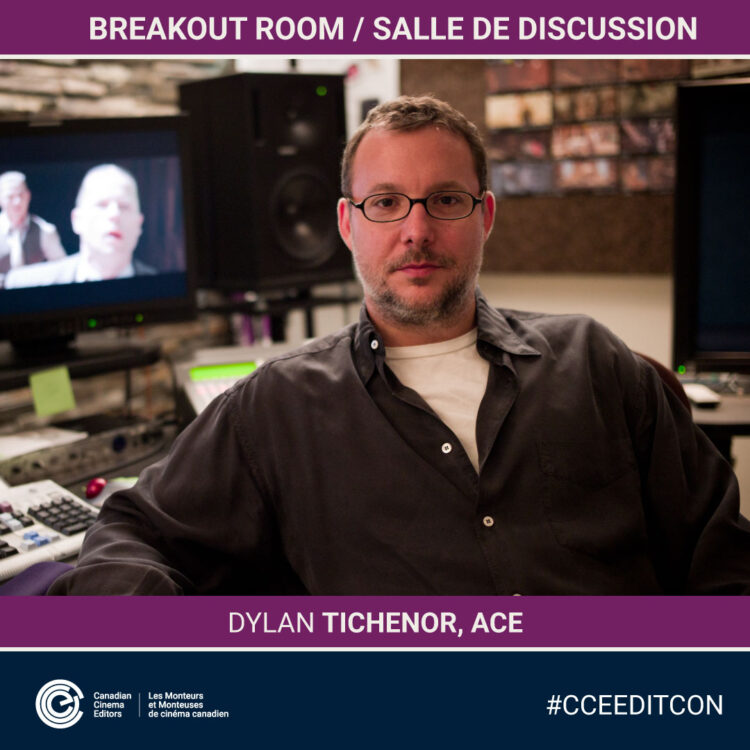 Join the two time Oscar nominated editor behind Marvel’s recent blockbuster, ETERNALS. With a career spanning 25 years there’s nothing Dylan hasn’t tackled. From BOOGIE NIGHTS; THE ROYAL TENENBAUMS; BROKEBACK MOUNTAIN and ZERO DARK THIRTY are just a few of the brilliant films from his back catalog. Bring your questions and grab your notebook, you’re going to want to take notes.
Join the two time Oscar nominated editor behind Marvel’s recent blockbuster, ETERNALS. With a career spanning 25 years there’s nothing Dylan hasn’t tackled. From BOOGIE NIGHTS; THE ROYAL TENENBAUMS; BROKEBACK MOUNTAIN and ZERO DARK THIRTY are just a few of the brilliant films from his back catalog. Bring your questions and grab your notebook, you’re going to want to take notes.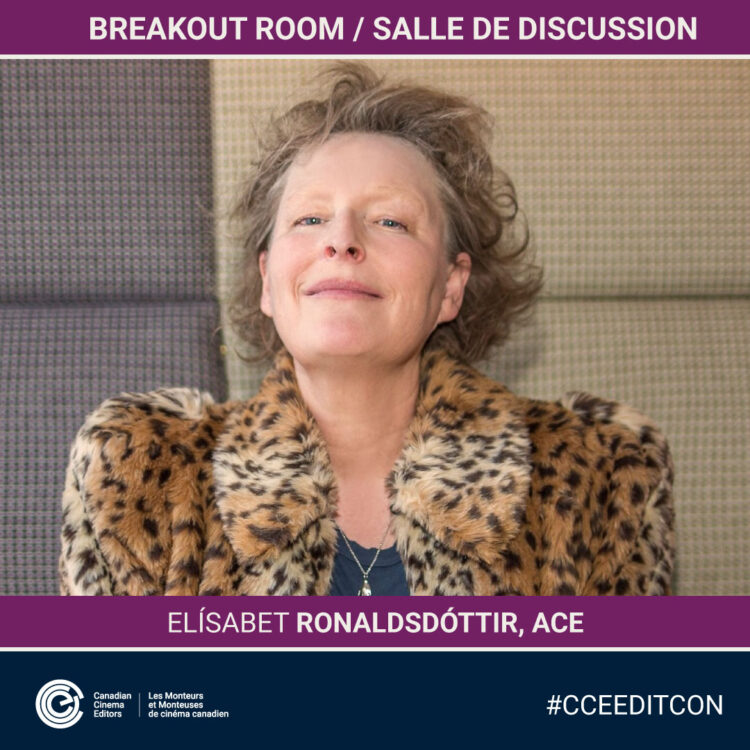 Brace yourself for a thrilling question period with one of Hollywood’s go to action editors. Her work co-editing SHANG-CHI AND THE LEGEND OF THE TEN RINGS is her latest outing in her long run of action packed features including JOHN WICK; ATOMIC BLONDE and DEADPOOL 2 to name a few! If action is your thing this is a room you won’t want to miss.
Brace yourself for a thrilling question period with one of Hollywood’s go to action editors. Her work co-editing SHANG-CHI AND THE LEGEND OF THE TEN RINGS is her latest outing in her long run of action packed features including JOHN WICK; ATOMIC BLONDE and DEADPOOL 2 to name a few! If action is your thing this is a room you won’t want to miss. Gather your best questions and get ready for an amazing session with one of the co-editor’s of SHANG-CHI AND THE LEGEND OF THE TEN RINGS. Harry’s rock solid knowledge of editing such dramas as DETROIT, EUPHORIA and the Oscar nominated MINARI was instrumental in creating this film’s smashing success. Make sure you’re prepared to take in all you can from this rare talent.
Gather your best questions and get ready for an amazing session with one of the co-editor’s of SHANG-CHI AND THE LEGEND OF THE TEN RINGS. Harry’s rock solid knowledge of editing such dramas as DETROIT, EUPHORIA and the Oscar nominated MINARI was instrumental in creating this film’s smashing success. Make sure you’re prepared to take in all you can from this rare talent.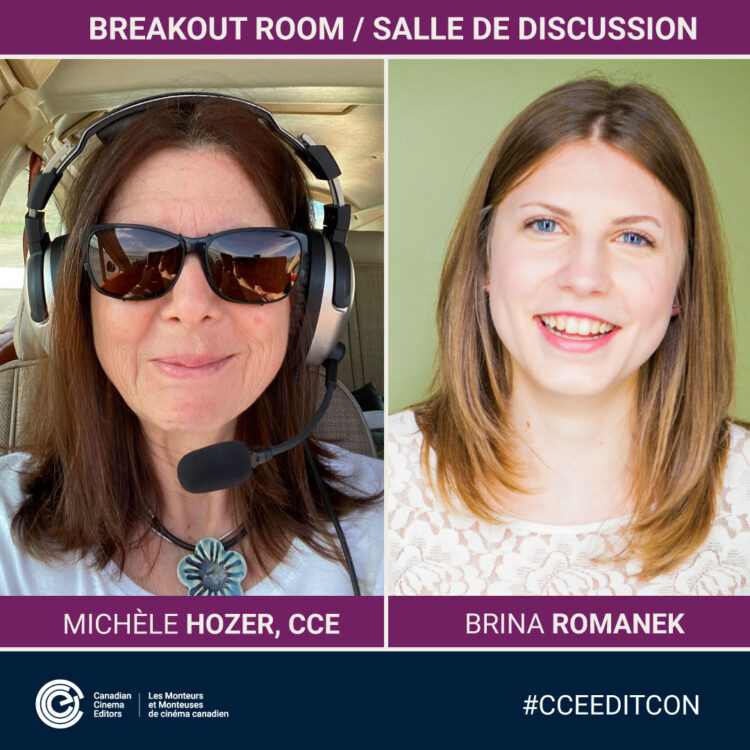 Sit down with this mentor/mentee pair to answer your questions regarding all things mentorship. Learn more about their process and collaboration on A CURE FOR THE COMMON CLASSROOM, the importance of mentorship and much more.
Sit down with this mentor/mentee pair to answer your questions regarding all things mentorship. Learn more about their process and collaboration on A CURE FOR THE COMMON CLASSROOM, the importance of mentorship and much more.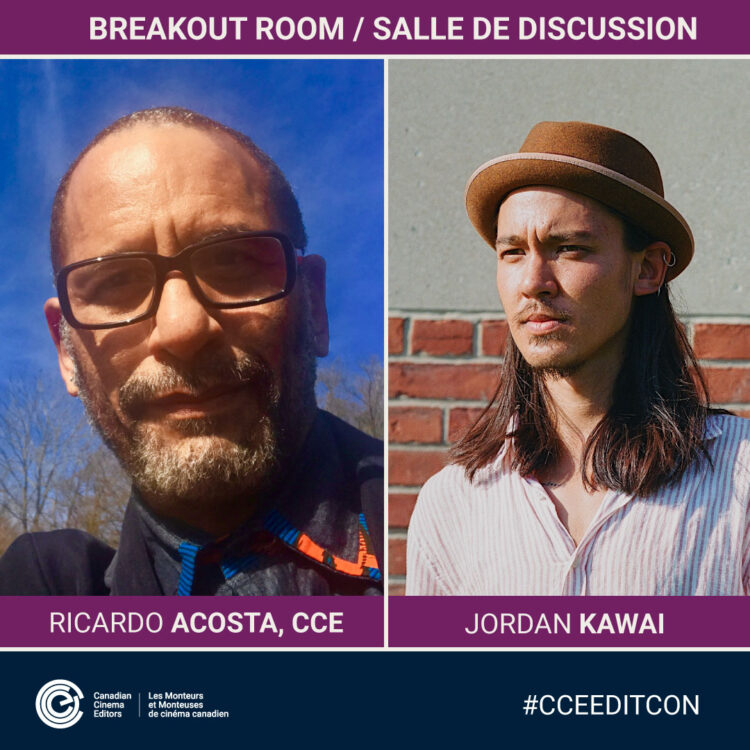 Put on your thinking cap and bring your queries for this mentor/mentee pair. They’ll dig into your questions about how their mentorship relationship has evolved, how BETRAYAL came to be and all things mentorship.
Put on your thinking cap and bring your queries for this mentor/mentee pair. They’ll dig into your questions about how their mentorship relationship has evolved, how BETRAYAL came to be and all things mentorship.








